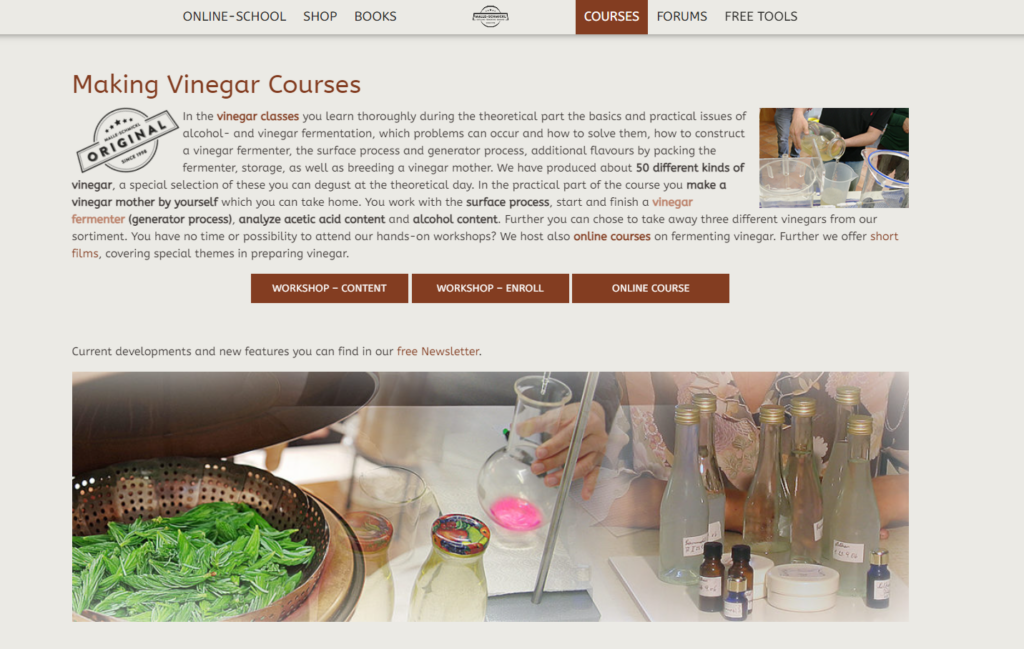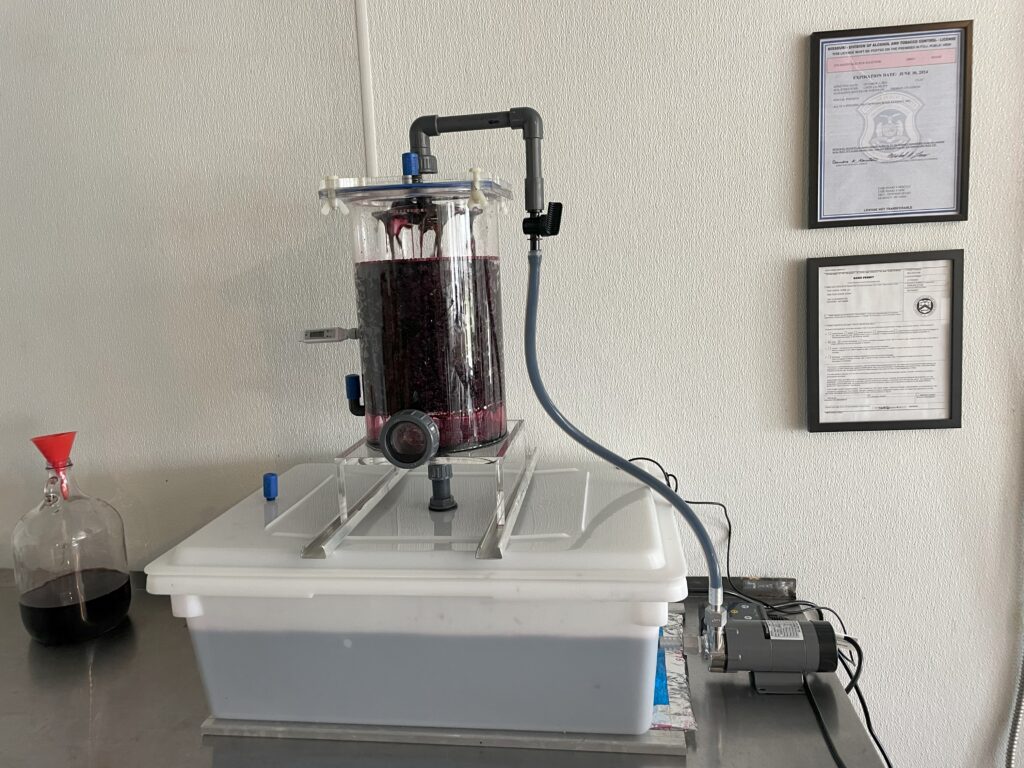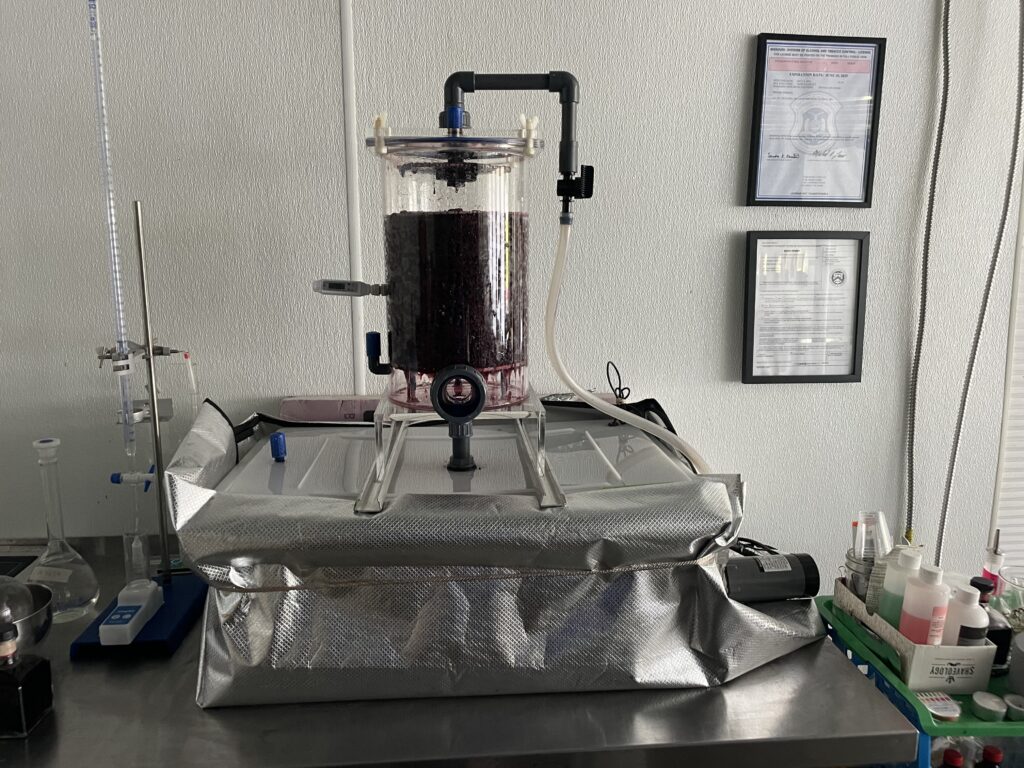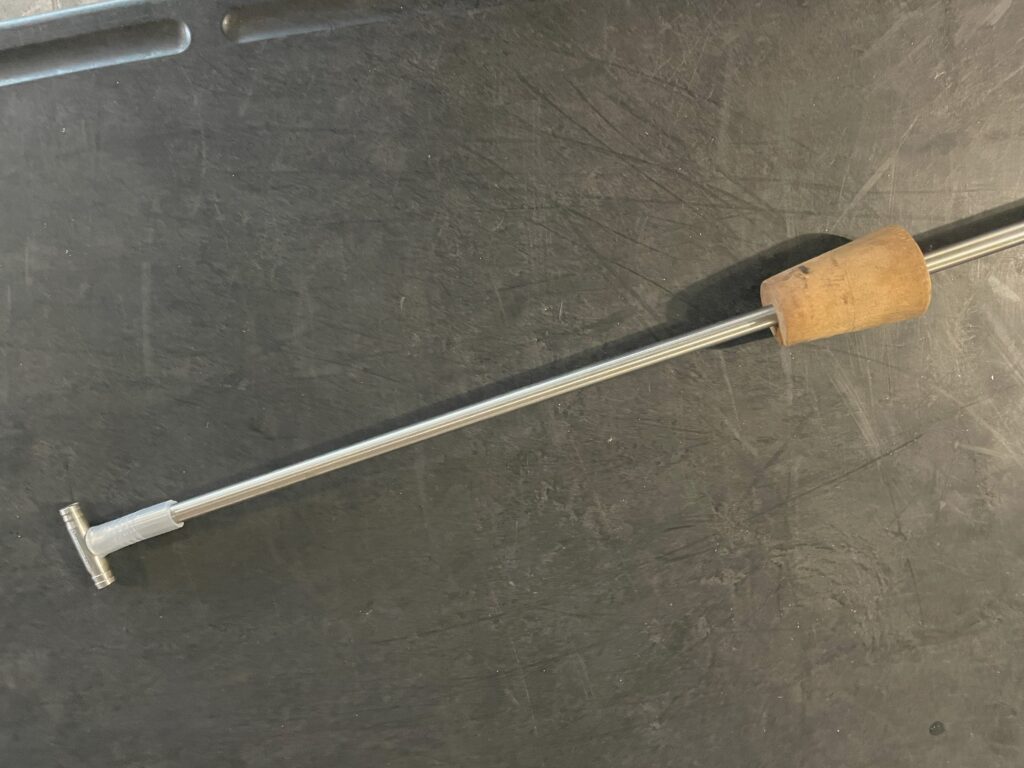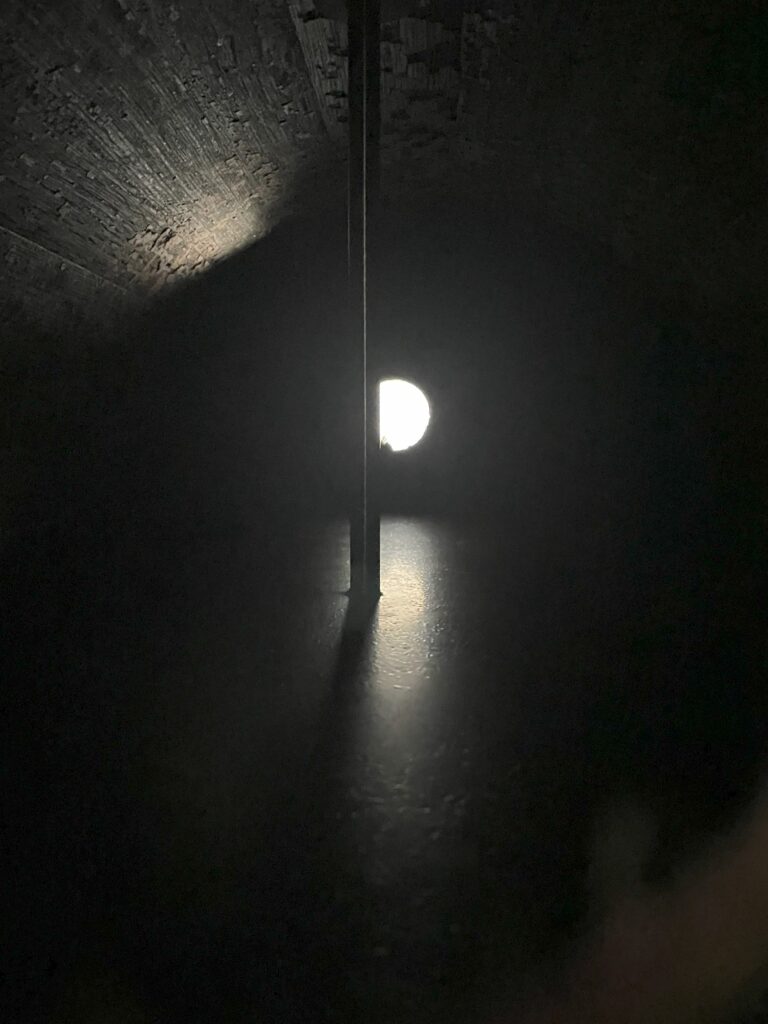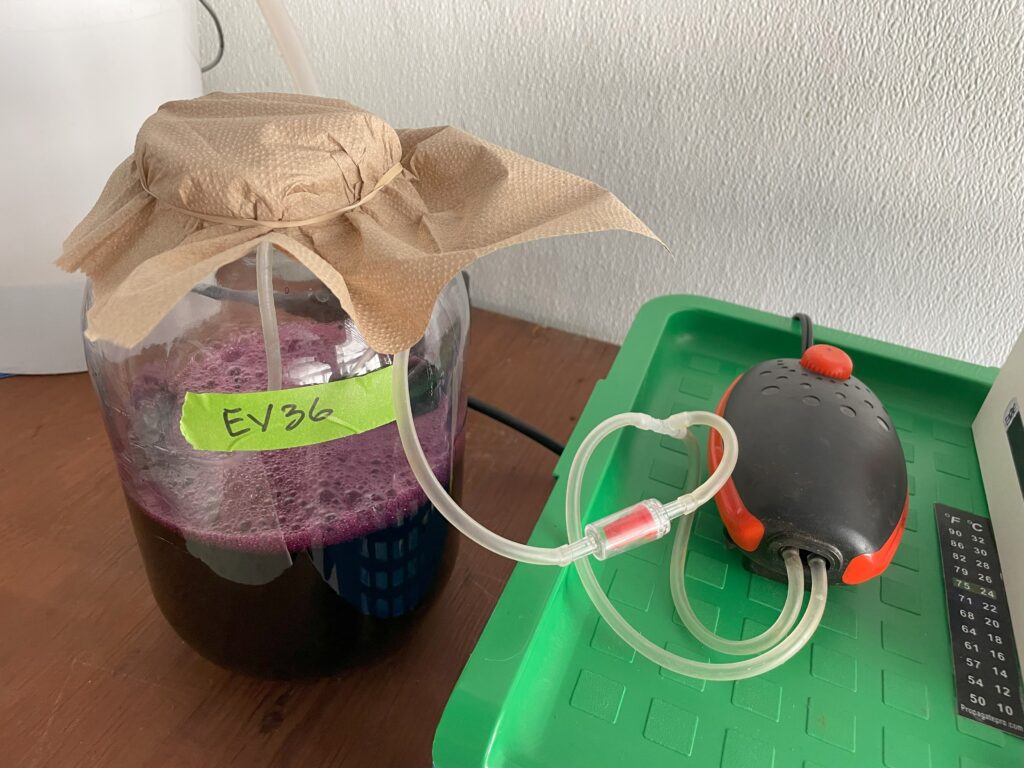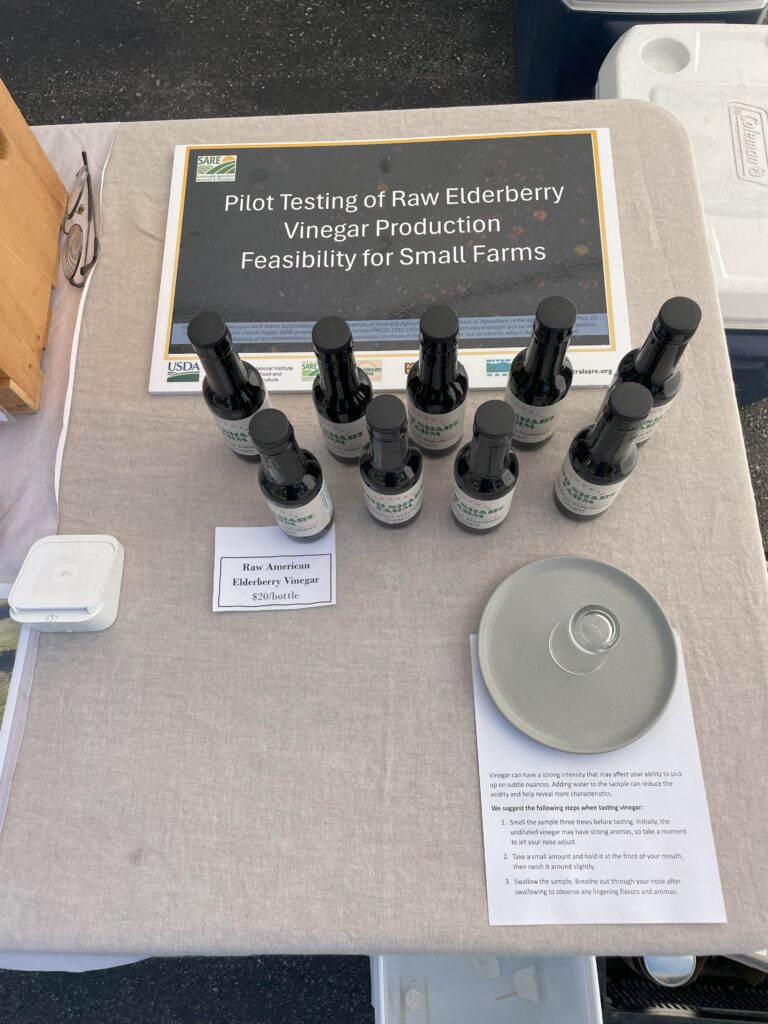Final report for FNC23-1390
Project Information
Thomas Ruggieri, fermenter/farmer. Tom has farmed for 20 years and runs the Fair Share Farm fermenting kitchen. The elderberry vinegar project will benefit from this on-farm facility and his operations experience. As a former environmental engineer Tom also has a background in permit applications that can help with procuring applicable Federal licenses for the project. Tom will be responsible for all farm-scale vinegar production operations.
Rebecca Graff is a co-farmer at Fair Share Farm and coordinates our field activities. She has overseen the planting, cultivation, care and propagation of over 200 elderberry bushes on the farm. She will manage the horticultural operation of the project.
Chef Kendall Harris is a Kansas City native and local African-American chef. He works part-time at Fair Share Farm as part of a personal pursuit of the skills and experiences needed to understand and apply fermentation in the kitchen. As former owner of The Happy Apple Café he is a restauranteur, and is pursuing the concept of opening a "fermentation lounge" in KC. His interests also include better understanding how to apply sustainable principles to restaurant applications. He will be evaluating restaurant-kitchen-scale application of vinegar production.
Fair Share Farm staff. Our staff will assist with operations including harvesting and production when additional labor is needed.
Dr. Chung-Ho Lin of the University of Missouri College of Agriculture, Food and Natural Resources will conduct the health analyses of vinegar samples. Dr. Lin has worked specifically with evaluating the chemical properties of American elderberries in the past and has the experience and accumulated knowledge needed to determine any health benefits of elderberry vinegar.
River Hills Harvest is at the forefront of American elderberry growing and value-added product production in Missouri. They have offered to help both with outreach and distribution of any quality finished products generated as a result of this project.
American elderberries are a native fruit in Missouri, and a viable agricultural product. Craft vinegars are a value-added agricultural product in many parts of the world, but not in the US. Tests at our farm have shown that raising elderberries, fermenting them to wine and then to vinegar is viable, and creates an aesthetically pleasing item. Craft vinegar operations can help give elderberry producers another option for adding value to the harvest.
There are no current vinegar production farms in the area. The project will evaluate various production processes to determine the viability of each for small-farm and restaurant-kitchen operations.
The anti-viral properties of elderberry juice is well established. It is not known, however, what beneficial health attributes of the American Elderberry (Sambucus canadensis) will remain (or be enhanced) after a two step fermentation process. We will be teaming with MU analytical lab to determine the answer.
Additionally, by connecting with the local restaurant community we hope to create a new craft category that will help increase the use of local elderberries, and provide a better knowledge of the benefits of sustainable agriculture.
Objectives
A. Determine operations viability of at least 4 different wine-vinegar setups:
- Food-grade bucket (passive)
- Orleans barrel (passive)
- Bubbler/aerator system
- Fixed film reactor
B. Obtain necessary licenses and approvals from Federal agencies to produce alcohol and store it as vinegar production stock. Outline steps to obtain approvals to help others through the process.
C. Determine culinary benefits of vinegar from each production type.
D. Determine health chemistry of vinegar.
E. Determine public demand for local craft elderberry vinegar.
F. Determine feasibility of restaurant production of elderberry vinegar
Solution
Obtain necessary licenses and approvals
Production of alcohol is regulated by the US Alcohol and Tobacco Tax and Trade Bureau (TTB). Per TTB:
If you make vinegar from fresh fruit or juice, (this type of vinegar is classified as nonbeverage wine) you must:
- Qualify as a bonded wine cellar by filing an application and bond with TTB using Permits Online. If you make only vinegar, you will not need the Federal Alcohol Administration Act wine producer's permit that is required for producers of beverage wine.
- Obtain approval for your formula indicating how you plan to make nonbeverage wine /vinegar.
- Keep records and file reports in accordance with 27 CFR part 24, subpart O.
As a part of this project we will develop a step-by-step process primer to help others navigate the regulatory aspects of producing vinegar from elderberry fruit.
Operations evaluation
Operations analysis of various elderberries to wine to vinegar processes will be conducted. American elderberries from our farm (both cultivated and wild varieties) and/or purchased from River Hills Harvest(500 lb +/-) is planned. Prior to initiating operations, we will purchase and complete an on-line vinegar production course developed by the Malle-Schmickl company in Austria.
Wine making will be completed using food grade barrels and buckets as fermenters. Organic sugar and water will be added as necessary. Finished wine will be stored.
Vinegar processing will be completed using 4 different methods:
- Passive method. Placing wine in a modified food grade bucket and waiting for vinegar mother to form and convert the wine to vinegar.
- Orleans process. Created in France in the 17th century, it is a process where a wood barrel on its side is filled halfway with wine. Openings are cut into the ends of the barrel to allow air to enter and a mother of vinegar to form and convert the wine to vinegar.
- Vinegar generator. The Malle-Schmickl company produces and sells vinegar generators that can process from 1 to 25 gallons of wine into vinegar. Vinegar can be produced in a tenth of the time that the more passive methods require.
- Bubbler system. A fourth way to process vinegar is by bubbling air into the wine. A small-scale bubbler system will be constructed to test this method using an aquarium aerator and suitable container. It will be the main restaurant kitchen method of testing and will be carried out on a small scale.
Evaluate culinary benefits of vinegar from each production type.
Tastings of the elderberry vinegar will be performed once an acceptable product has been produced. Each tasting will include the opportunity to complete a survey card.
Evaluate health chemistry of vinegar from each production type.
We will work with The University of Missouri (MU) to evaluate the health benefits and chemistry of the elderberry vinegar once a suitable product is produced.
Evaluate public demand for local craft elderberry vinegar
As a regular vendor at the Brookside Farmers Market we will get a first hand account of public demand once we have product to sell.
Evaluate feasibility of restaurant production of elderberry vinegar
Chef Kendall Harris will evaluate the feasibility of the production of vinegar in a restaurant setting. This will include determination of legal requirements, preparation of a small batch of vinegar, and an evaluation of the restaurant infrastructure and operations systems necessary to produce elderberry vinegar.
Research
Obtain Necessary Licenses and Approvals Winery License/Permit
Final licenses were obtained for the project on October 1, 2023. In addition to the US Alcohol and Tobacco Tax and Trade Bureau (TTB) permit, it was determined that a Missouri Bureau of Alcohol and Tobacco Control (MO ATC) license was also required.
Both the State and Federal alcohol control bureaus are focused on the registering of alcohol manufacturers and sellers so that tax can be collected. Since our wine is converted into vinegar there are no excise taxes levied on our wine. Once the permits were issued we were required to report our wine storage inventory monthly to MO ATC and annually to TTB, but had no tax obligations. We do have an annual fee to pay to MO ATC of $200, but no fees are required by TTB.
The focus of the information required for both permits is to provide legal proof of the legitimacy of the individual owners, the corporation, the location of the operation, and the legal access of the applicants to the property where the winery and wine storage is located. MO ATC and TTB submittal and approval processes are described below.
Missouri Bureau of Alcohol and Tobacco Control Application for Manufacturer-Solicitor License
The State of Missouri Bureau of Alcohol and Tobacco Control application was filled out, the information below compiled, and the package hand delivered to their local office.
- Completed application form, signed by the applicant(s) or managing officer and notarized.
- LICENSE FEE – Annual fee for our operation is $200.
- CRIMINAL RECORD CHECK – Submission of a criminal record check. Must be dated within six (6) months of the date of application. Record checks are required for the 1) sole owner, all partners, or the managing officer, 2) each officer/director for the applicant entity, and 3) each stock/share holder, trustee, or person owning or controlling, legally or beneficially, directly or indirectly, ten percent or more overall of the applicant entity.
- MISSOURI RETAIL SALES TAX LICENSE – Copy of Missouri Retail Sales Tax license in the name of the applicant, partners, or Corporation or Organization with the correct address of the business to be licensed.
- CERTIFICATE OF NO TAX DUE – From the Missouri Department of Revenue; must be dated within 90 days.
- TAX RECEIPT – Copy of the paid personal property tax or real estate tax receipt for the preceding year of the sole owner (sole proprietor), all partners (partnership), or the managing officer (LLC or corporations).
- VOTER REGISTRATION – Proof of voter registration of the sole owner (sole proprietor), all partners (partnership), or the managing officer (LLC or corporations).
- PHOTO(S) – Gray-scale or black and white computer printouts are acceptable so long as features are clear.
- Recent photograph of the sole owner, each partner, or the managing officer (depending on the business structure) without a hat or sunglasses.
- Recent photograph of the front of the building to be licensed and any detached storage areas.
- COPY OF SIGNED LEASE, DEED OR RENTAL AGREEMENT – Copy of lease, rental agreement or contract of sale, or copy of warranty deed for premises to be licensed (must be in the name of person, persons or entity applying for the license).
- CERTIFICATE OF GOOD STANDING – From the Secretary of State or applicable state authority, dated within 90 days for the applicant organization.
- COPY OF FEDERAL PERMIT – From TTB (Alcohol Tax & Trade Bureau).
- TAX BOND – A Corporate Bond form properly executed by a bonding company and signed by the sole owner, all partners, or managing officer; or, an Assignment of Certificate of Deposit form properly executed by your banking institution and with the notarized signatures of the sole owner, all partners, or managing officer. The initial amount shall be $1,000.00.
- HEALTH INSPECTION – Copy of a completed state health inspection if the applicant will also be wholesaling product. If not wholesaling, a health inspection may be obtained from the local public health agency.
- SITE VISIT – Contact the local district (see the district service areas under the “Return Documents To” section) to set up a pre-licensure site visit.
On October 1, 2023 we received approval from MO ATC. In June of 2024 we renewed our license.

US Treasure Tax and Trade Bureau Winery Permit
The Federal application took place completely on-line. Initiating the application process took some time, as we did not want to enter a US Treasury tax system without a clear picture that we were filling out the correct “paperwork.” Once the path necessary for our operation to apply became clear the process was rather straightforward.
The application required information similar to the MO ATC requirements and were input using the Permits Online Federal system. Required info included:
- Business entity information (organizational documents, etc.)
- Survey description of wine premises
- Wine premises security
- Building and winery layout description
- Personal (owners) information
- Bond-we submitted a bond but it was later returned as we were informed it was not required for our operation

The final permit is available here: ttb permit page 1
Operations Evaluation
Overview
The production of vinegar from raw fruit requires three steps: juice extraction, fermentation of sugars to alcohol with yeast, fermentation of alcohol to acetic acid with aerobic bacteria. These three steps have been practiced in different forms for thousands of years.
Step 1: Juicing/Mashing
Historically vinegar has been made from a variety of products including wine, beer and cider. Each of these requires an initial step to extract the sugars from the source ingredient. For wine and cider this generally involves crushing of fruit, and with beer, cooking of grain with water.
Step 2: Alcoholic Fermentation
Alcohol can be formed from sugar-containing products with the use of yeast. The yeast consumes the sugar and excretes alcohol. This process is known as alcoholic fermentation. It takes place without oxygen.
Step 3: Acetic Fermentation
Acetic fermentation happens in two stages and takes place with oxygen. First, acetaldehyde is formed from the alcohol with use of oxygen. As long the bacteria Acetobacter aceti (already in beer, wine, and cider), is present, fermentation will continue until acetic acid is finally produced. This process has historically been performed by letting a container of wine sit exposed to the air for several months (aka "the slow process"). In the early 1800's a second process known as the "fast process" began to be used for vinegar production. It consists of dripping wine over a media. The U.S. Food and Drug Administration mandates at least 4 percent acidity for vinegar.
Prior to our approval to make wine on October 1, 2023 preliminary work was conducted to further research vinegar production methods, and trial juice, wine and vinegar methods to be used in the study.
Completion of On-line Vinegar Course
The Malle-Schmickl Vinegar Making Course was purchased upon approval of the project. This course proved to be extremely valuable, providing fundamental information that has helped us in our trials and troubleshooting. The course includes information on all aspects of our planned operations, from juicing to winemaking to vinegar production.
Malle-Schmickl on-line course and equipment purchasing site
In-house Monitoring and Analytical Requirements
One thing learned from the class was the importance of having the ability to conduct in-house analyses on the juice, wine and vinegar. In his book A Practical Treatise on The Manufacture of Vinegar (1900), Willam T. Brannt notes “ It may therefore be said that the entire art of the manufacture of vinegar consists in an accurate knowledge of the conditions of life of the vinegar bacteria and in the induction of these conditions of life.”
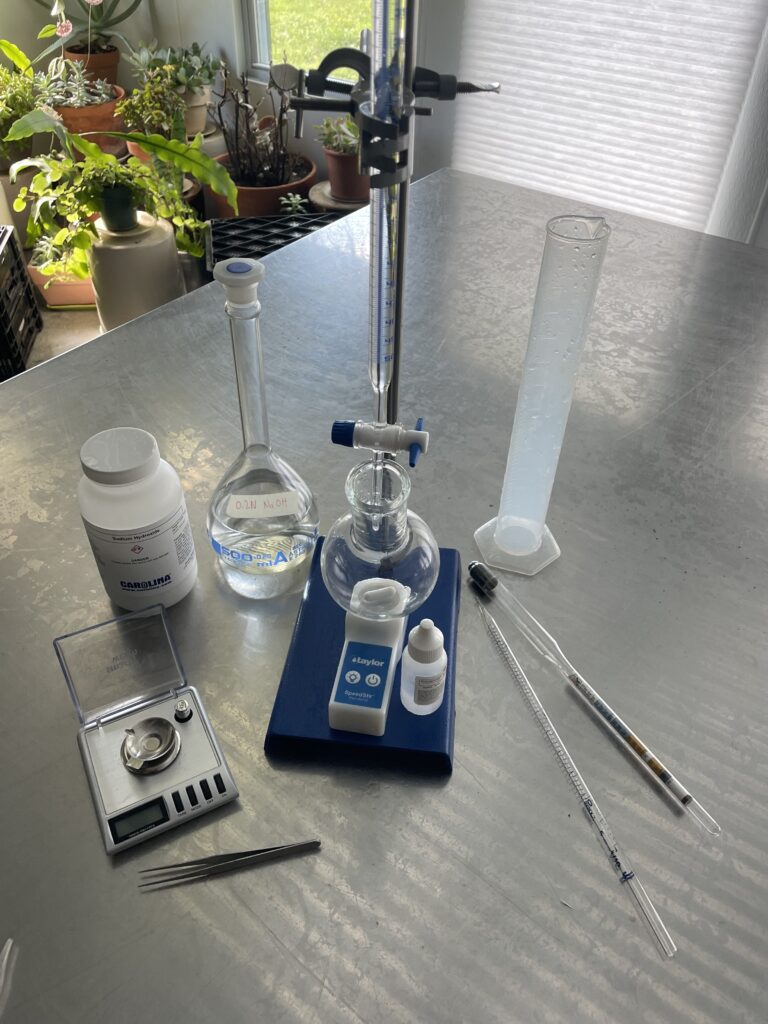
Prior to the initiation of the project our kitchen was equipped to conduct only sugar testing. Acidity testing equipment was purchased from online sources, and the Malle-Schmickl method alcohol testing equipment was purchased directly from Malle-Schmickl in late 2023. Parameters measured included the following:
| PRODUCT | TEST PARAMETER |
| Juice | Sugar concentration (°Brix) |
| Wine | Sugar concentration (°Brix) |
| Temperature | |
| Acidity | |
| Alcohol | |
| Vinegar | Temperature |
| Acidity | |
| Alcohol |
Sugar
Sugar levels in the juice and wine were determined using a standard beer/winemaker’s hydrometer. This simple apparatus is available at wine/beermaking supply stores. Sugar levels in the juice may also be tested using a hand-held refractometer, also available at wine/beermaking supply stores.
Acidity
Acidity testing was conducted using a wet chemistry method that requires titrating a known concentration of sodium hydroxide solution into a sample until an endpoint is reached, which is indicated by a color change in the solution being tested (colorimetric test method). Due to the regular testing of acidity, a laboratory-type setup was assembled that included the following equipment:
- Burette and stand
- Magnetic stirrer with light
- Magnetic stirring bar
- Sample flask
- 5 ml pipette
- Gram scale
- 500 ml volumetric flask
- Phenolphthalien solution
- Sodium hydroxide pellets
Regular acidity testing required a significant amount of sodium hydroxide solution. This required the additional step of preparing the reagent. For our study we prepared a 0.2 N sodium hydroxide solution by adding 4.0 grams of sodium hydroxide pellets to a 500 ml volumetric flask and filling it with distilled water.
In order to verify that our acidity testing was accurate we submitted four vinegar samples to the University of Missouri Grape and Wine Institute (GWI) laboratory for testing. A comparison of the results is presented below and shows that, on average, our results match those of the GWI lab.
| MU GWI | FSF | ||
| Sample | % acidity | % acidity | difference |
| EV44 | 6.15 | 5.88 | 0.27 |
| EV42 | 5.64 | 5.50 | 0.14 |
| EV310 | 4.36 | 4.68 | -0.32 |
| EC48 | 5.32 | 5.38 | -0.06 |
| Average | 5.37 | 5.36 | 0.01 |
Alcohol
Alcohol testing was performed occasionally on the vinegar to determine if the alcohol content of the solution had decreased to a point where the transformation to vinegar was complete. This test is rather complex. The testing apparatus was purchased from Malle-Schmickl. The equipment and procedure are presented on their webpage.
Production Logs
Testing and monitoring required a significant amount of time over the course of the project. For each batch of juice, wine and vinegar a Production Log was produced, recording the results of the testing and other information relating to the batch. Information collected included:
- Batch number
- Prep date
- Workers
- Batch and container size
- Ingredients
- Date & time of testing, test results, worker initials, remarks
Copies of a blank Wine Production Log and Vinegar Production Log are presented below. Juice production was recorded on the Wine Logs.
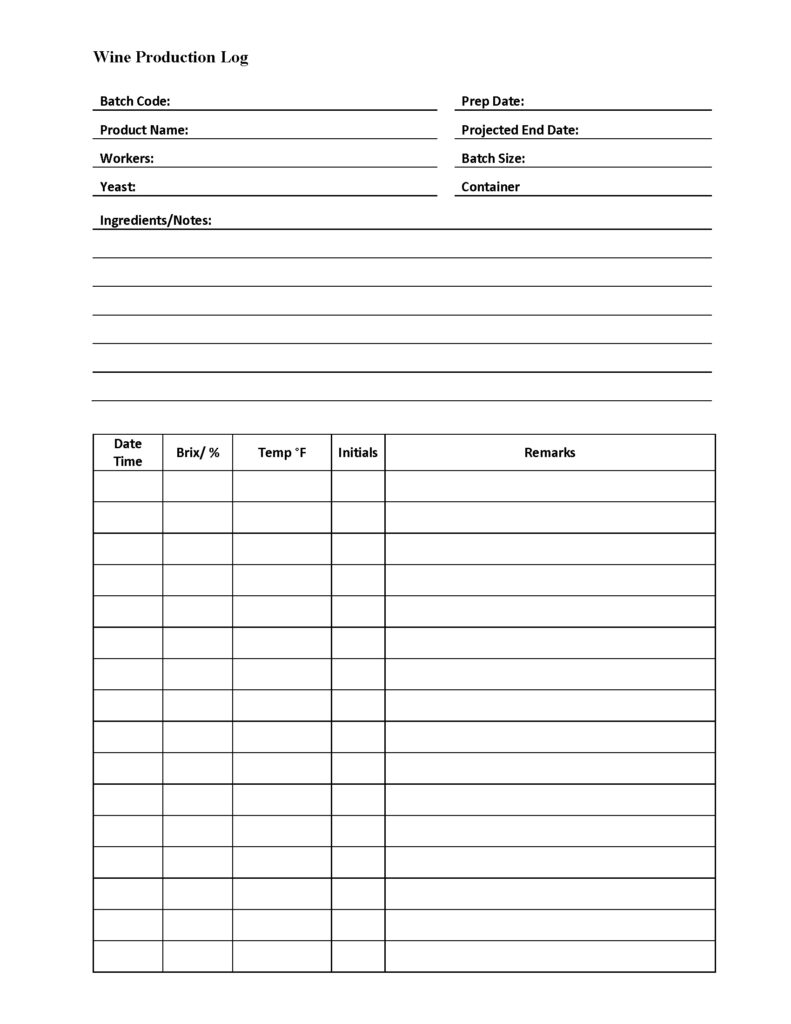
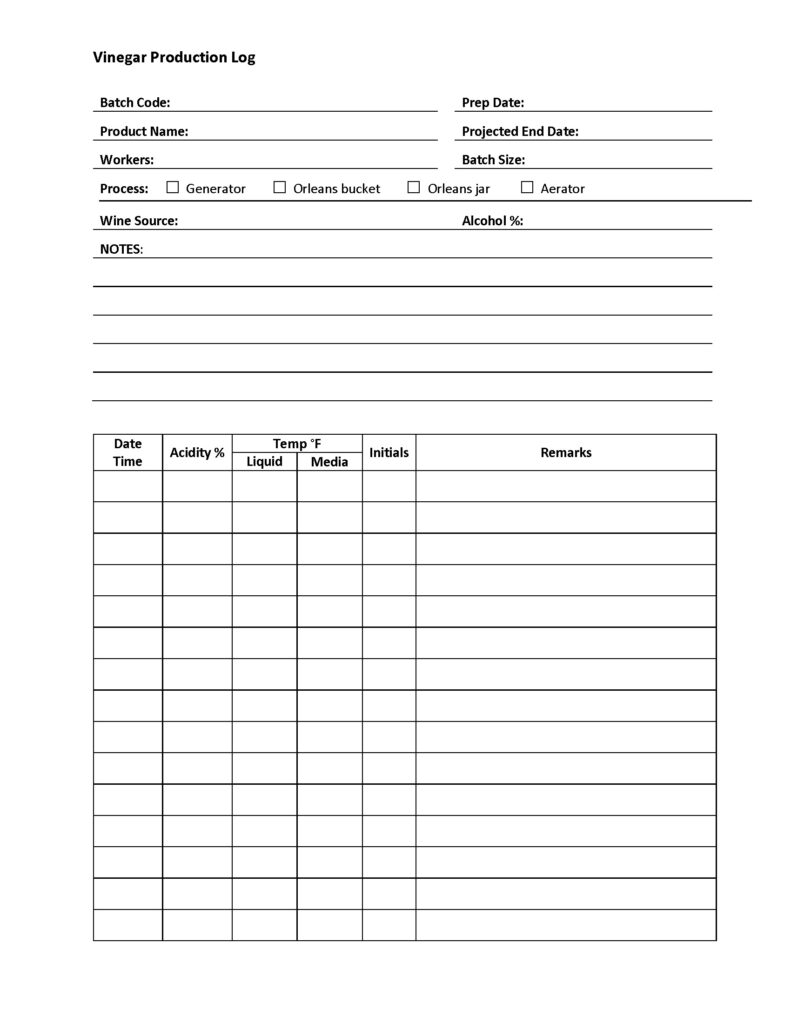
Juice Production
The juicing of the elderberries is a critical step in the wine/vinegar making process. Prior to the initiation of the project, we had made farmstead elderberry wine by crushing and macerating elderberries. When Terry Durham of River Hills Harvest saw the vinegar we had made from that juice, he said it was “oxidized," due to its burgundy color. This oxidation is a negative impact on the quality of the juice. We also sought input from elderberry juice processors in Missouri. Ernie Bohner of Persimmon Hill noted “don’t crush seeds, it creates a bitter juice”, indicating that too strong a physical pressure is also damaging to the berry.
Most all winemaking recipes for elderberry wine obtained on-line or from books involves steaming or otherwise cooking the elderberries to extract the juice. These methods can also oxidize organic and beneficial compounds, and were not used during the project. Our goal was to create the purest, least oxidized juice possible. We therefore chose to use a winemaking screw press (100-year old family heirloom), and gently press the berries. All elderberries used in the study were purchased from River Hills Harvest.
Juicing method was as follows:
- Frozen berries were thawed for 1 to 2 days, placed in a filter bag, and pressed in an 18 inch diameter screw press with basket.
- The pressure applied was critical. The press was hand-cranked until snug, held for several minutes, released for several minutes, and pressed snug again. This was repeated until it appeared all free draining juice was expelled from the berries.
- The skins and seeds (pomace) were saved for subsequent processing into wine.
The berries were juiced in several small batches (25 to 50 lb) during the preliminary evaluation phase. The main batch was 375 lbs. of berries that were juiced into 20.5 gallons of juice and 208 lb pomace. In general, the juice yield was 45 - 50% by weight of the berries. Sugar concentration of the juice was between 8 and 10 °Brix.
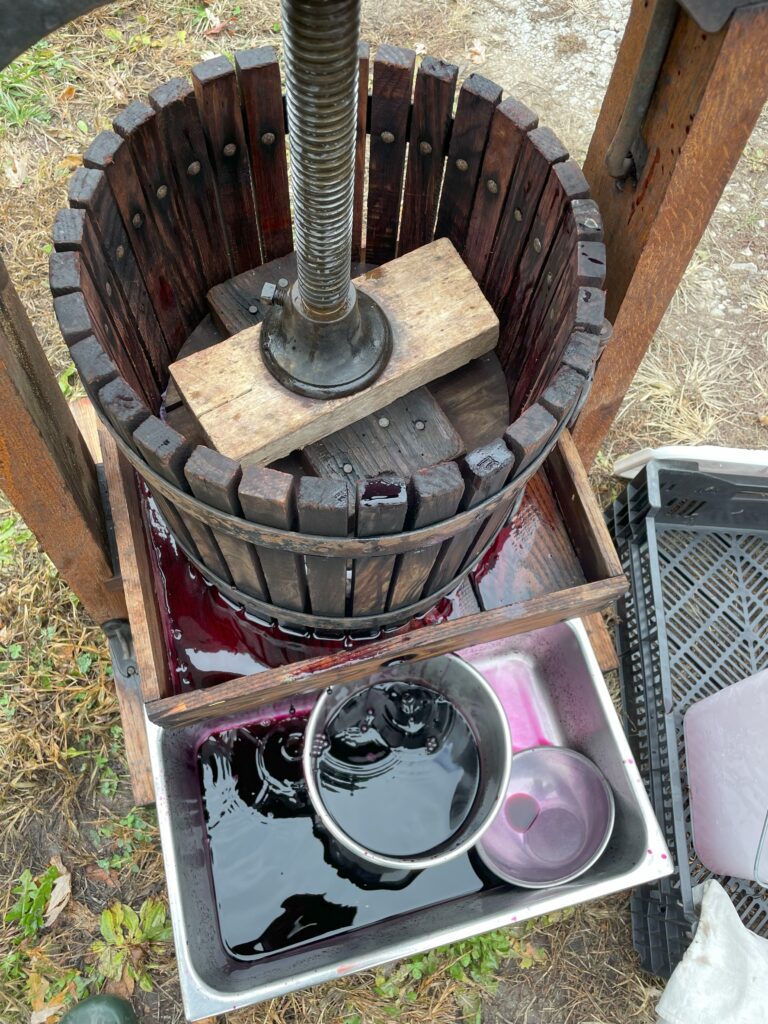
Wine Production Trials
Wine Style Options
The effort necessary for the production of a consistent, high-quality elderberry wine did not receive much detail in the project proposal. This key step, however, required quite a bit of research and trialing. While the project team has over 20 years of experience making wine directly from grapes, the preparation of a fruit wine from elderberries proved to be a bit of a different process.
Wine production contains a lot of variables, including; what yeast to use, how high an alcohol level to achieve, whether the juice and crushed berries (pomace) should be fermented together or separately, temperature of the fermentation, and other factors. Based on our winemaking experience, and knowledge gained during the preliminary tests, the wine production method outlined below was developed.
Wine Production Methods
Elderberry juice can be quite viscous. During trials it was found that straight juice is difficult to ferment into wine due to this thick consistency. It was decided that it would be necessary to dilute the juice to a level where fermentation could proceed without a problem. While we will call the product of this process "wine," it is has the alcohol content less than 6%, making it more of a cider.
The following recipe was used for the wine made with juice:
- 2/3 (by weight) raw American elderberry juice (cold-press, low-pressure)
- 1/3 (by weight) sugar syrup at 12 °Brix (made with raw organic cane sugar and water)
- Sugar to bring combined solution to 12 °Brix
- Champagne yeast, Saccharomyces bayanus (Lavlin EC-1118 or Red Star Premier Cuvee)
A second style of wine was made with the pomace using the following recipe:
- 1/2 (by weight) raw American elderberry pomace
- 1/2 (by weight) sugar syrup at 12 °Brix (made with raw organic cane sugar and water)
- Sugar to bring combined solution to 12 °Brix
- Champagne yeast, Saccharomyces bayanus (Lavlin EC-1118 or Red Star Premier Cuvee)
For both styles of wine the target alcohol content was 6% ABV. This strength wine will produce a vinegar with a total acidity of between 5.0 and 6.0 %, which was also our target value.
For the main batch (375 lbs elderberries) the two style wines were fermented in separate open-topped 50-gallon plastic food-grade barrels. The fermentation took place in our processing kitchen to maintain a consistent temperature of 68 °F +/-.
The juice batch began fermenting within a day and created significant foam and bubbling. The wine was racked into carboys when the must had stilled, and the sugar level fell to 0-0.5% Brix. This took less than a week.
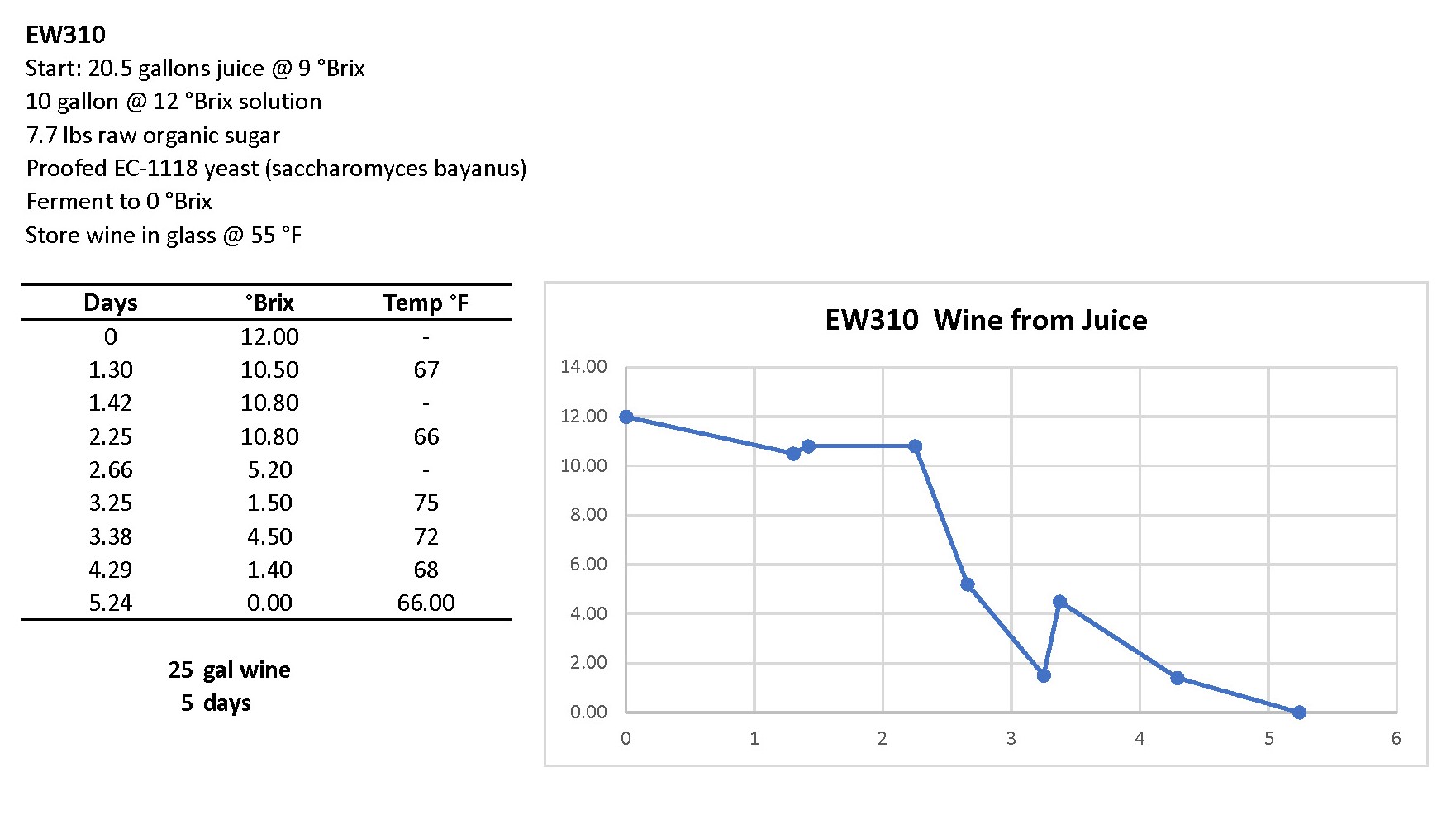
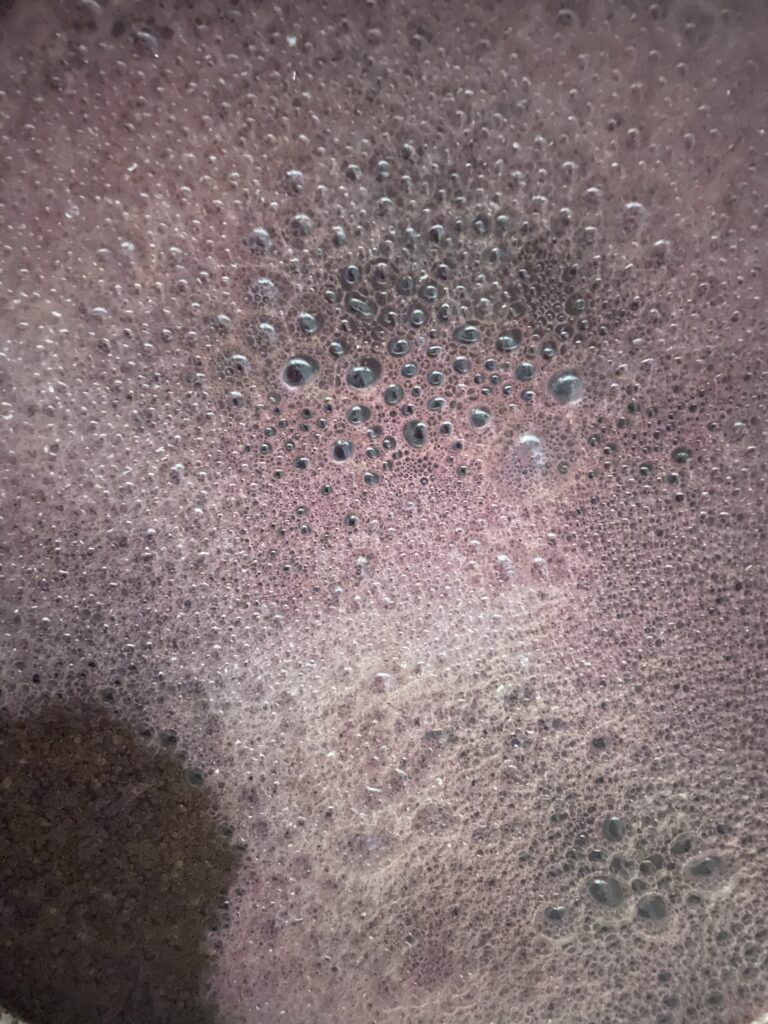
The pomace batch also proceeded quickly (less than one week). During the fermentation the skins and seeds rose to the top and were “punched down” 1 to 2 time per day. These berries began to release a small amount of waxy residue because of this physical activity, but this did not affect the overall fermentation. The skins and seeds were removed from the barrel after 4 days and lightly hand pressed to release any extra juice. The remaining liquid (wine) was then racked into carboys when the must had stilled, and the sugar level had fallen to 0-0.5% Brix.
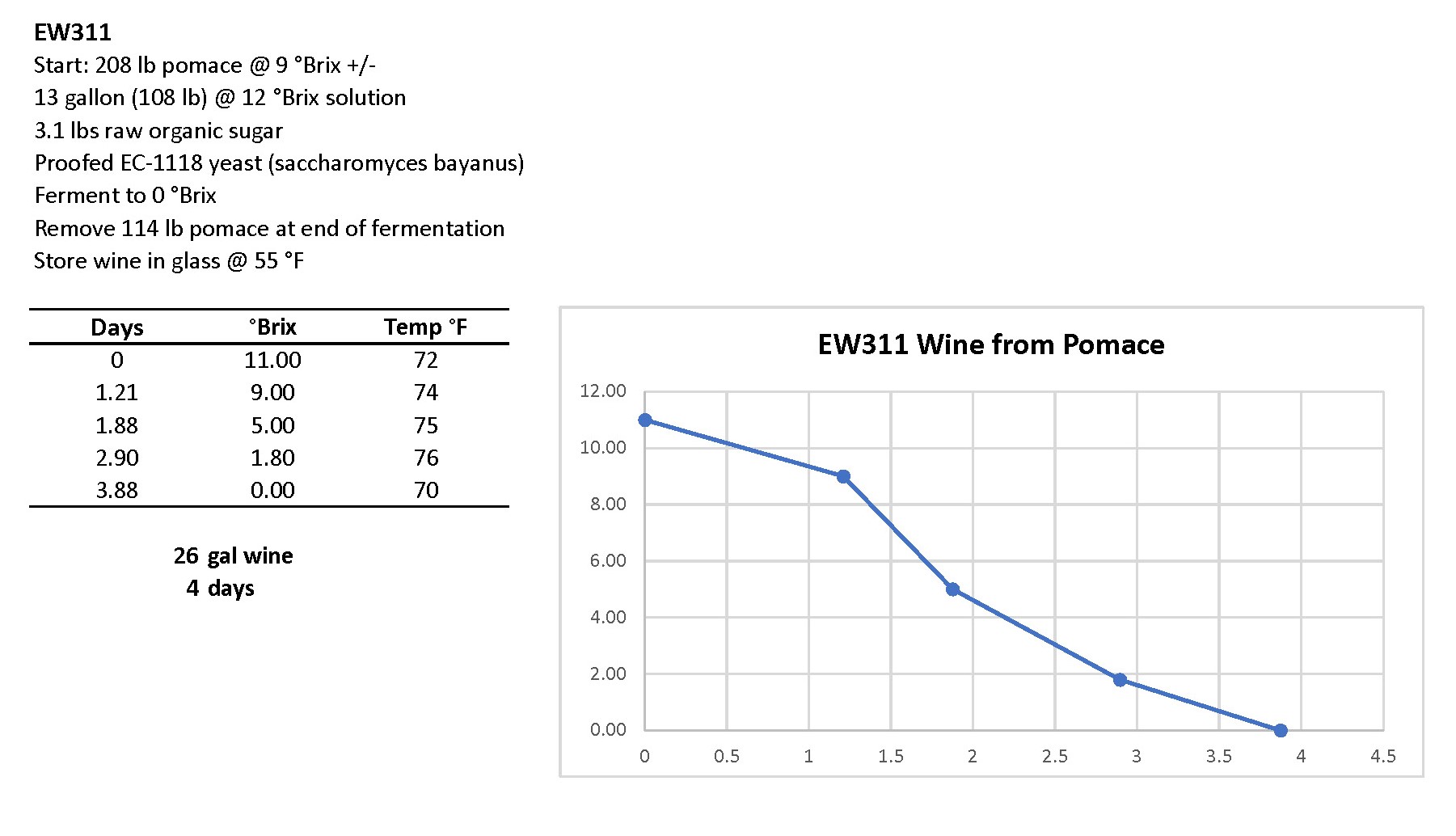
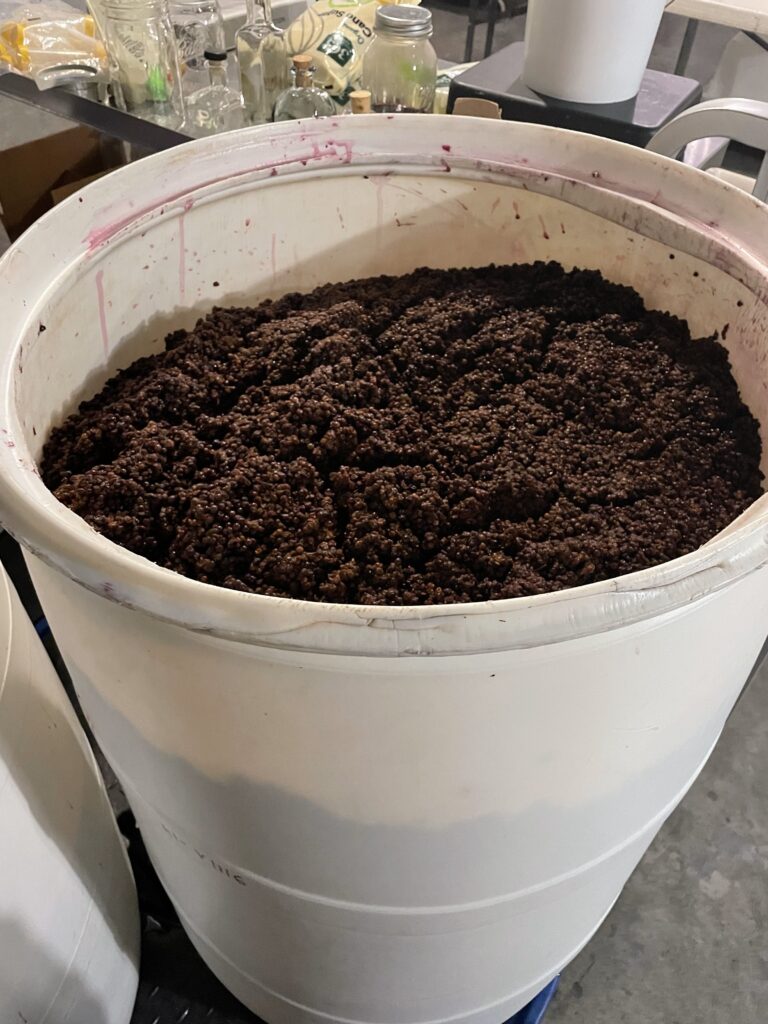
Using these two methods, 375 lbs of berries produced a total of approximately 48 gallons (400 lbs) of still wine. This wine was then stored in a 55 °F room in our lower barn to settle. The wine was held there until needed for vinegar production.
Vinegar Production Trials
The second fermentation step in the production of vinegar can be completed several ways. As a part of this project, we trialed 4 methods, and had the final products tested for beneficial components by the University of Missouri School of Natural Resources laboratory.
Vinegar Generator
Process Description
A vinegar generator was purchased from Malle-Schmikl as a part of the project.
Per Malle-Schmickl, the generator apparatus consists of a generator with packing material inside, and underneath that a container with the fermentation medium. At periodic intervals (15 minutes every 3 hours), the fermentation medium is pumped into the generator in such a way that it is sprayed onto the packing material. It then trickles back down into the container. Operation of the unit requires regular cleaning, and daily recordkeeping. Keeping track of the ferments' vital signs is important.
In order to keep the fermentation medium (vinegar/wine mixture) at a temperature of 84 °F we purchased a heat mat to set the container on, and insulated the container in an attempt to maintain a constant temperature.
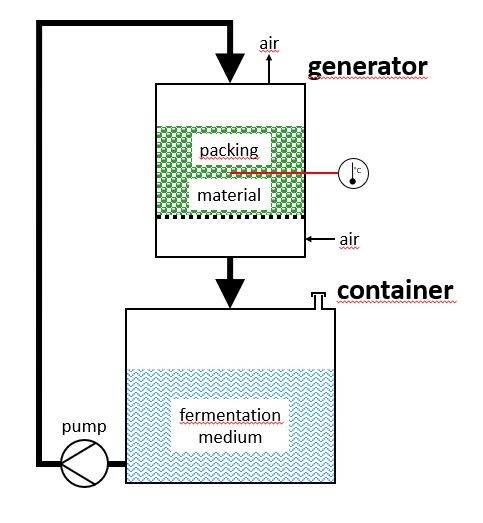
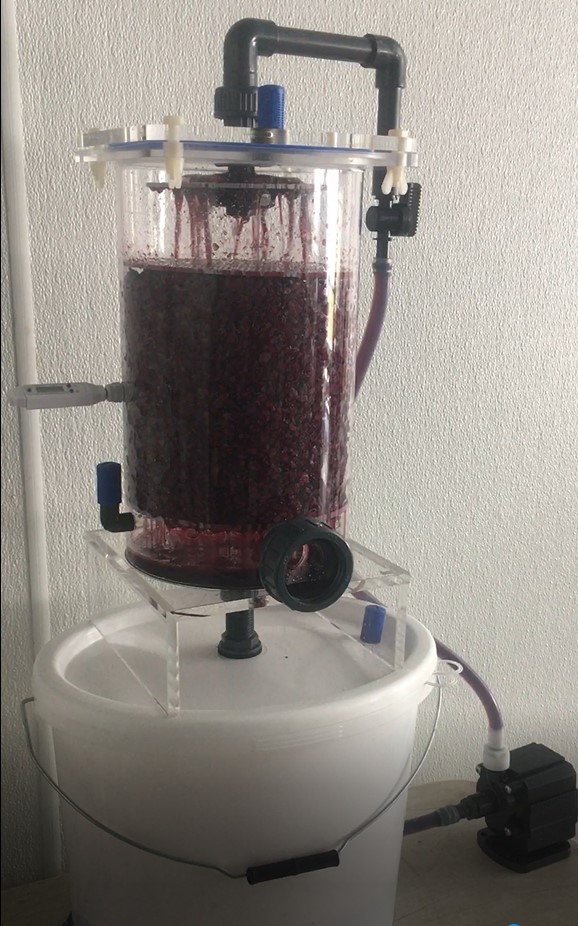
Vinegar Generator with 13 Gallon Reservoir
Vinegar Generator with Heat Mat and Insulation
Results
Bringing the vinegar generator into operation was a process that took quite a bit of time. This is due to the fact that each batch of vinegar requires that from 1/3 to 1/2 of the batch consist of already made vinegar. In effect, you have to make vinegar to make vinegar.
After starting up the generator using grape wine and strawberry wine, we produced our first trial batch of raw elderberry vinegar on November 2, 2023. In the first five months 10 batches were run, increasing in size from 5 quarts to 7-1/2 gallons. In general the generator performed consistently, with final acidity levels ranging between 4.8 and 5.8%. We collected samples from batch EV46 for analysis by MU. .
We were very happy with the final product quality and ease of operation, however, on occasion the unit plugged and overflowed, creating a loss of product and a mess. This problem has been alleviated by cleaning the unit once per week.
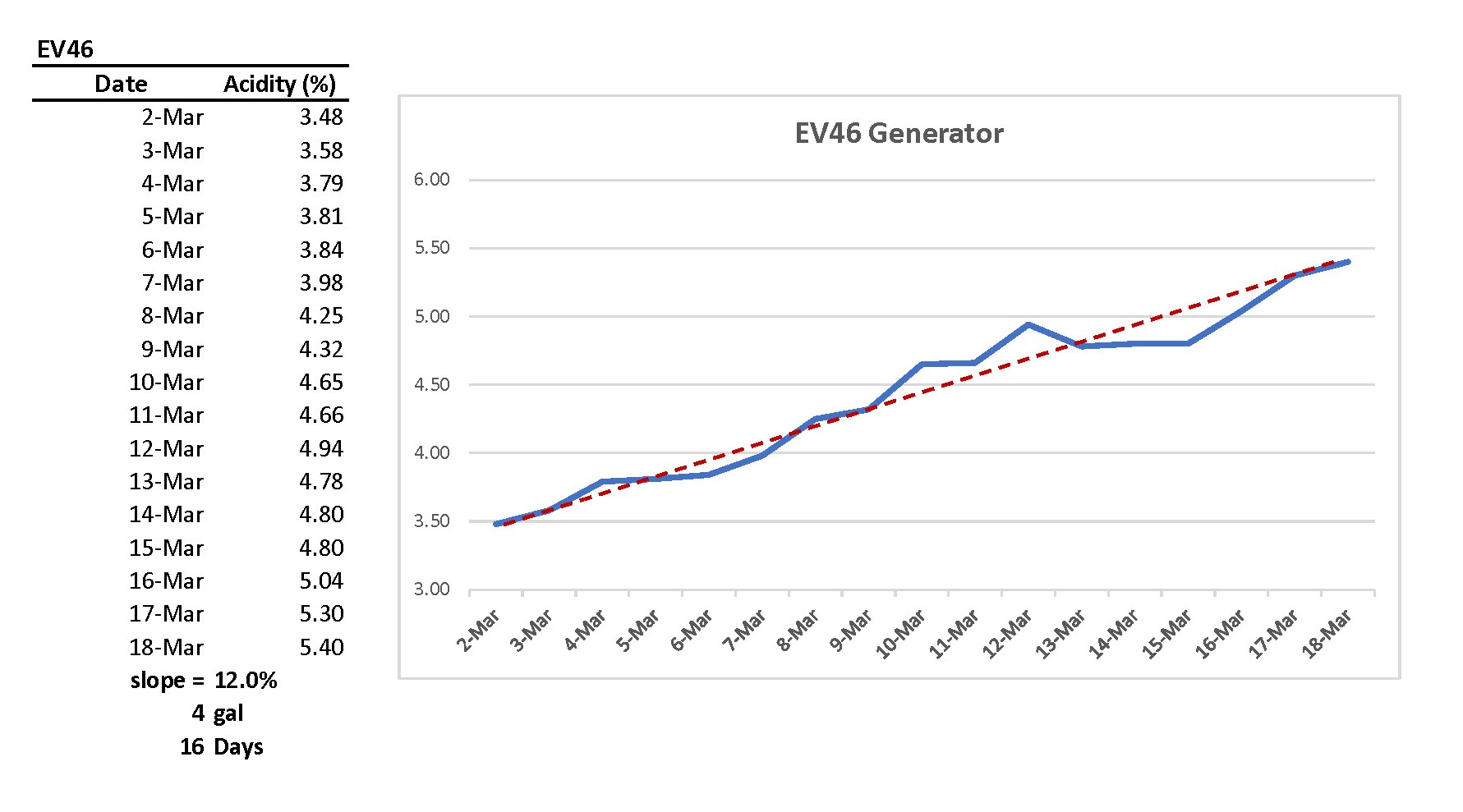
Vinegar Generator Batch EV46
Orleans Process – Barrel
Process Description
The Orleans process is a passive method of making vinegar that exposes a partially filled barrel of wine to air in a controlled manner. A 35-gallon wood barrel was purchased from a local farmstead distillery (Of the Earth, Richmond, Missouri) to serve this purpose. The barrel had previously held apple brandy and was in good condition when we received it.
The barrel was first tested for leaks by rinsing out all residue, filling with water to the halfway point, and letting it sit on its side for 3 weeks. No significant leaks were observed, and the barrel was deemed suitable for the project.
The barrel was modified to meet the requirement of an Orleans barrel in the following manner:
- Two 2-inch holes were bored in the head ends of the barrel, 1/3 of the way down, to serve as air holes and viewing ports. These ports were then covered with screening to keep fruit flies or other insects from entry into the barrel.
- A ½-inch stainless steel tube was fitted with a tee on one end, and that end lowered to the bottom of the barrel through the main bunghole on the top of the barrel.
- This tubing was then inserted in a wooden bung stopper and snuggly fit into the bunghole.
- The tubing served to allow for sample and final product withdrawal from the barrel by suction. This eliminated the need to install a drain spigot, which would have increased the potential for leakage from the barrel.
A key component of proper operation of the barrel is to maintain a temperature of approximately 84 °F +/-. We were “fortunate” to have a 5-ft x 5-ft insulated cooler box on the farm with a broken compressor, and converted the space to a “hot box” using a plug-in oil-filled radiant heat space heater. This allowed us to maintain a consistent temperature throughout the process.
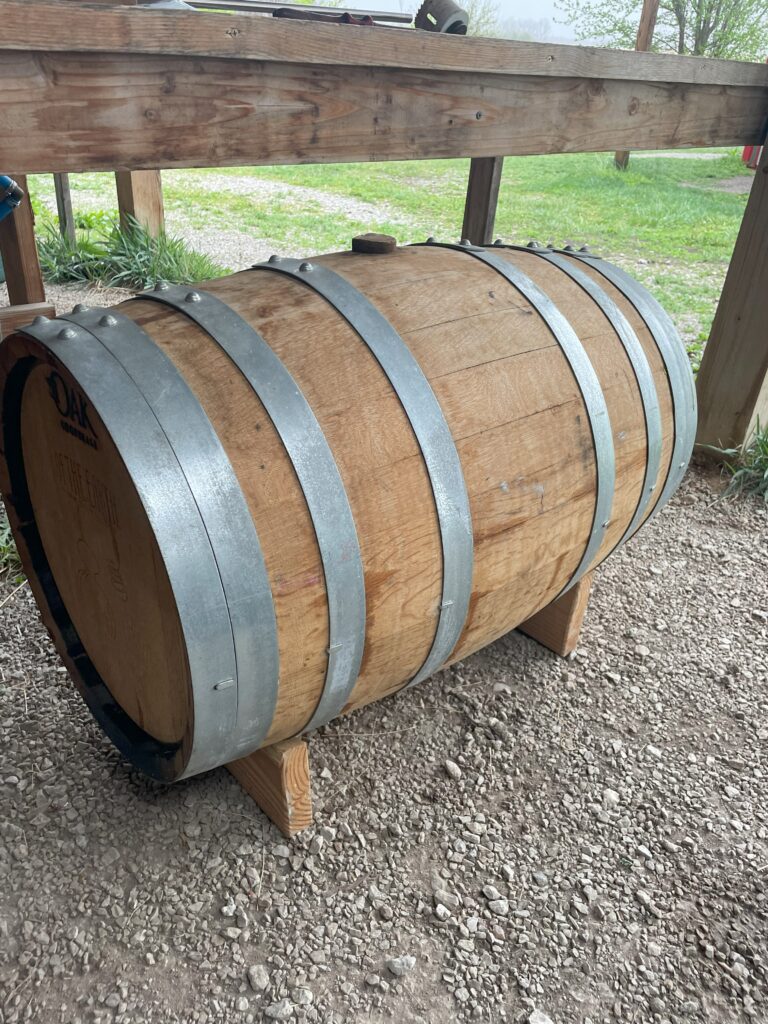
from Of the Earth Farmstead Distillery
Orleans Barrel Fill Port
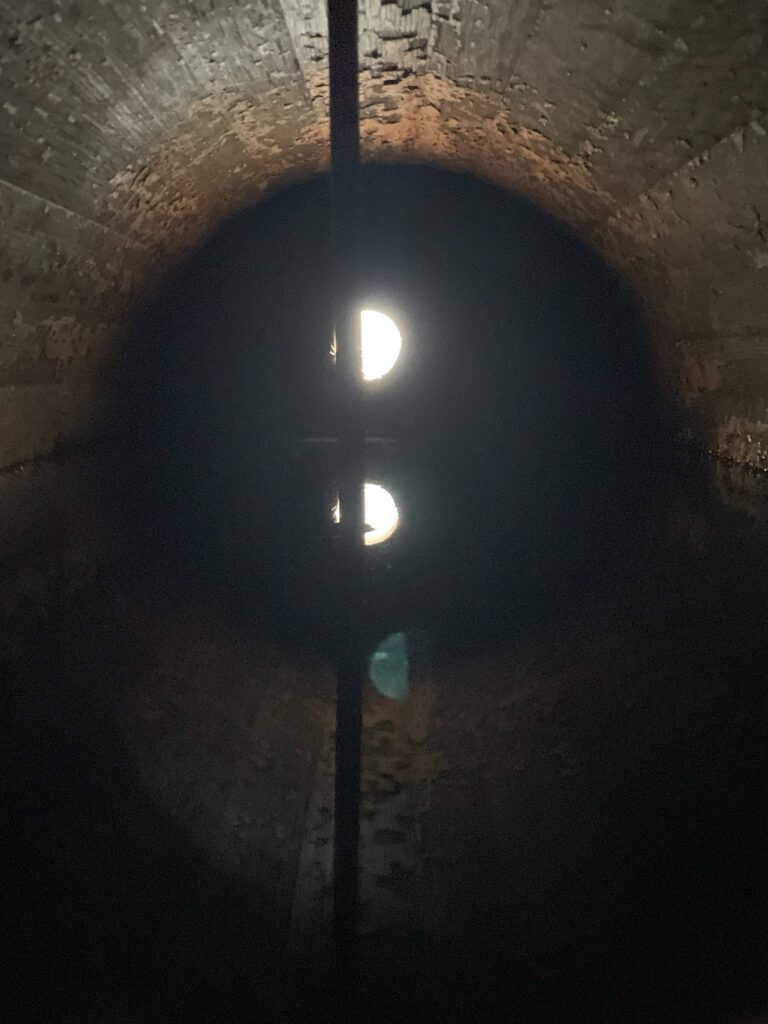
Orleans Barrel Initial Formation of Vinegar Mother
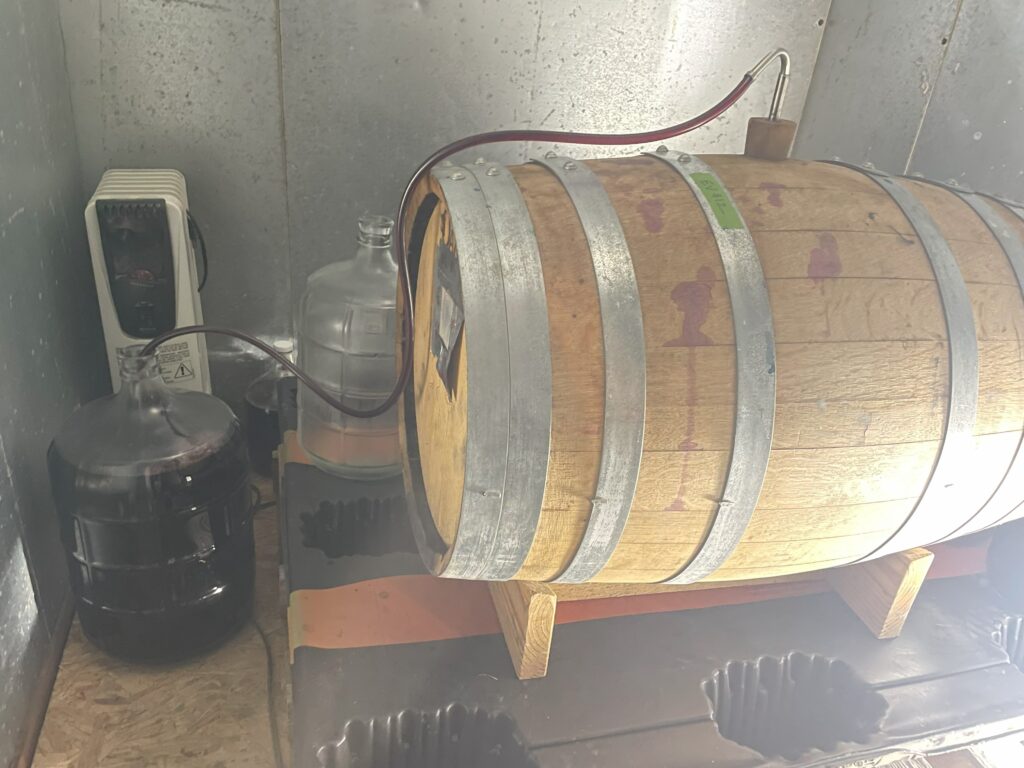
Results
The barrel was filled on April 18, 2024 with 7-1/2 gallons of wine made from juice and 7-1/2 gallons of raw elderberry vinegar made as a part of the project. The 7-1/2 gallons of vinegar used in this batch took 5 months to accumulate. It became apparent several months into the project that in order to make vinegar we needed to make vinegar.
The barrel had an initial acidity of 3.3%. A mother of vinegar film began appearing on the surface of the liquid after 3 days. This mother sunk 4 days later, but re-formed and grew throughout the rest of the batch.
The fermentation took 27 days to complete, and a final acidity of 5.4% was achieved. We collected samples from batch EV412 for analysis by MU.
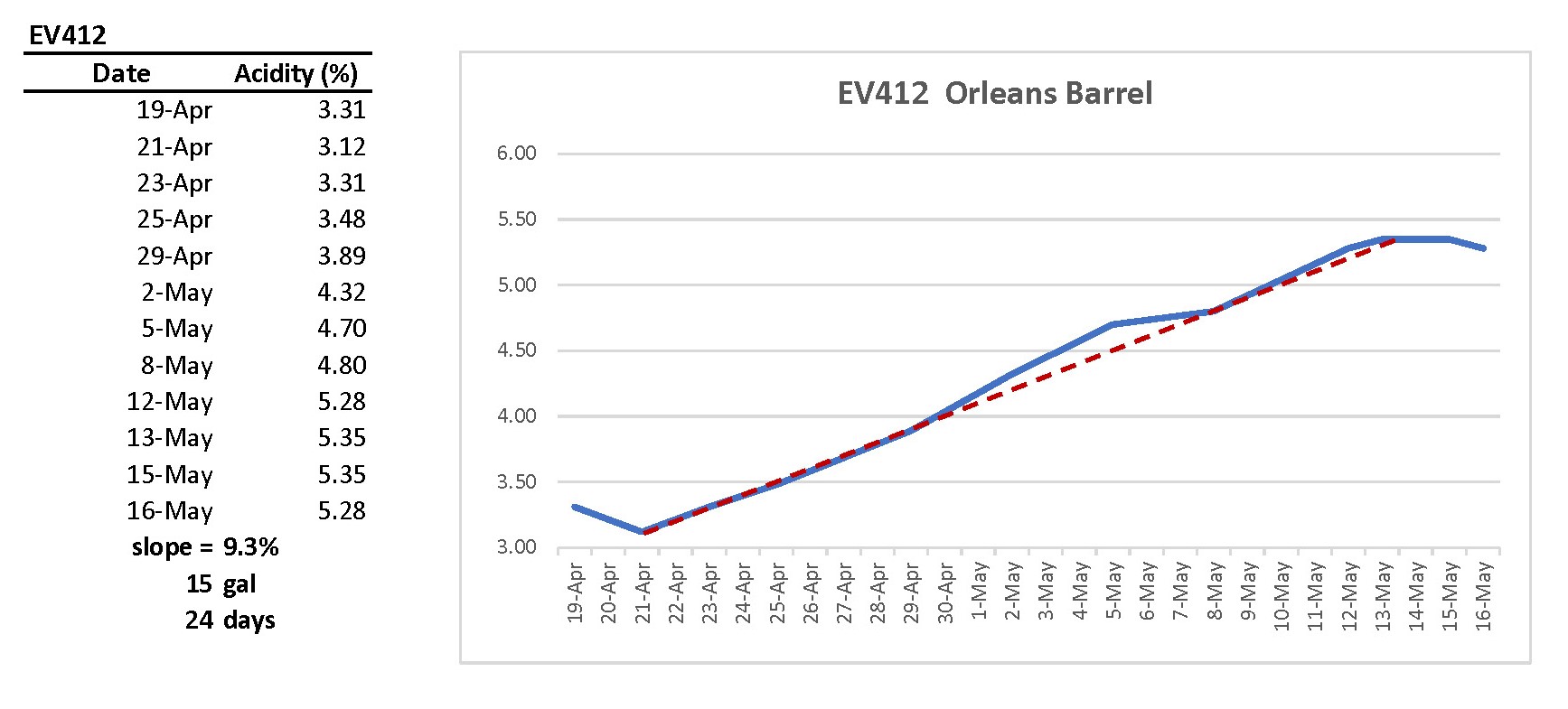
Orleans Barrel Batch EV412
Orleans Process – Bucket
Process Description
A 3-1/2 gallon food-grade bucket was built to the same principal as the Orleans barrel We did install a bottom spigot to drain the bucket, and a ½ inch PVC tube to allow bottom filling of the container. In order to keep the fermentation medium (vinegar/wine mixture) at a temperature of 84 °F we purchased a heat mat to set the container on, in an attempt to maintain a constant temperature.
Results
The bucket was filled on April 5, 2024 with 1 gallon of elderberry wine made from juice, and 1 gallon of raw elderberry vinegar made as a part of the project.
The barrel/bucket had an initial acidity of 3.5%. A mother of vinegar film began appearing on the surface of the liquid after 4 days. This mother sunk a week later, but re-formed and grew throughout the rest of the batch.
The fermentation took 14 days to complete, and a final acidity of 4.8% was achieved. We collected samples from batch EV410 for analysis by MU. We allowed the process to continue for two more weeks, to see if a higher acidity would be reached. Acidity levels did not rise, but leveled off and then began to drop. This is consistent with the expectations of vinegar production, as once all the alcohol has been converted to acetic acid the acid level will drop if left exposed to air.
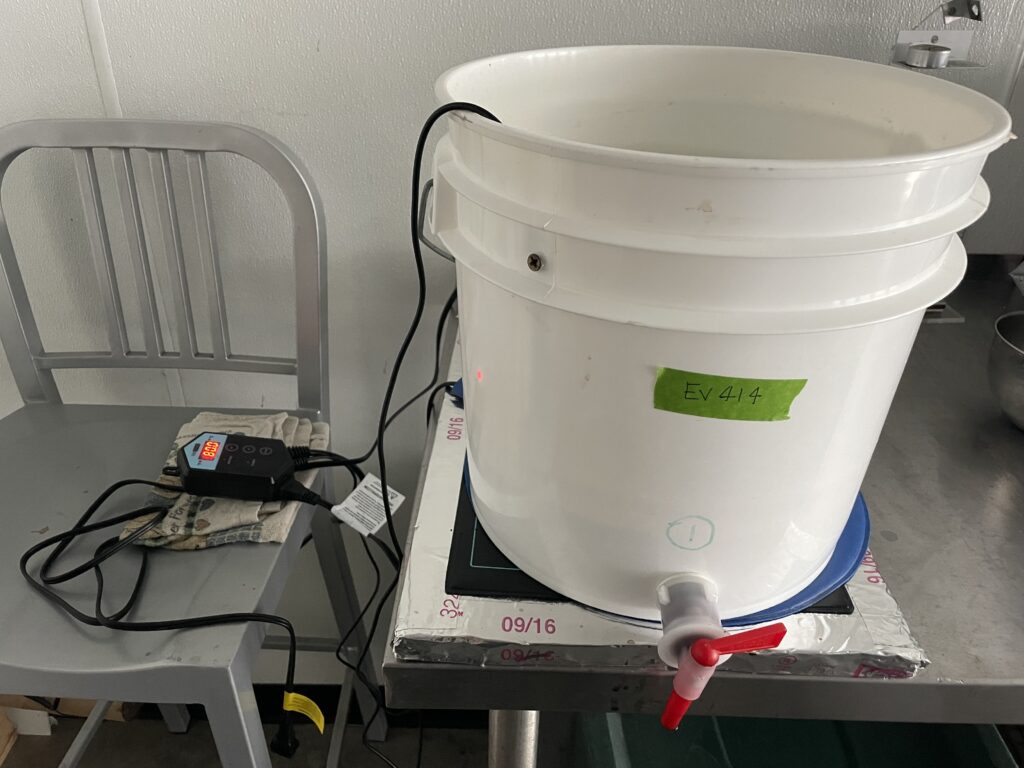
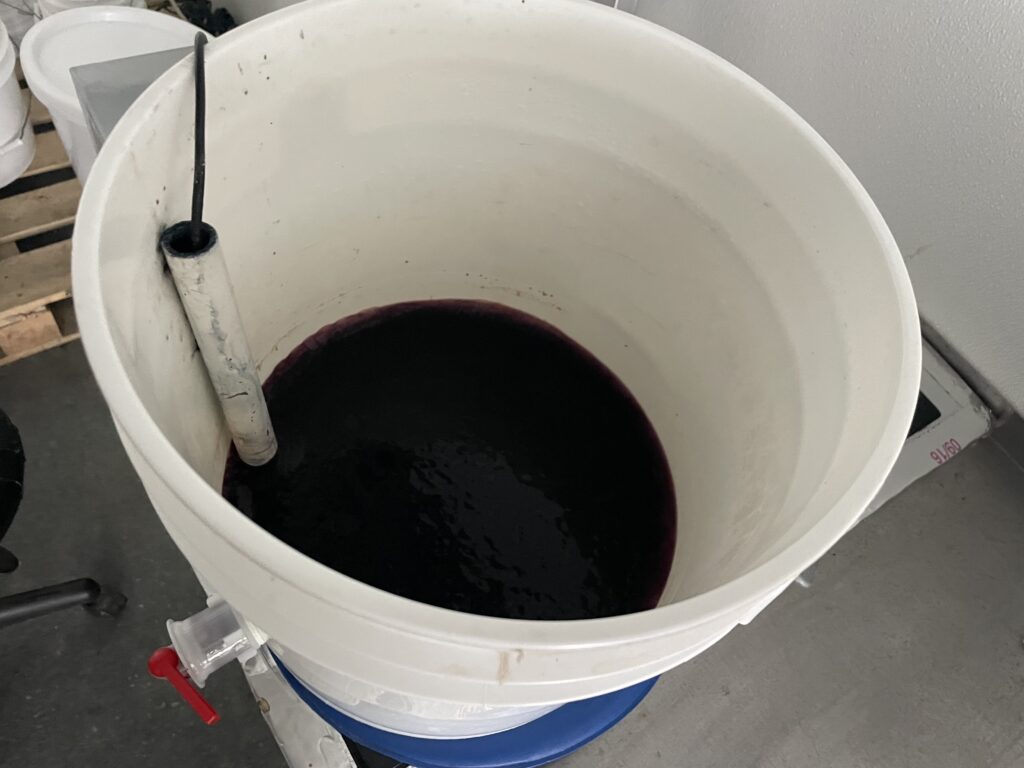
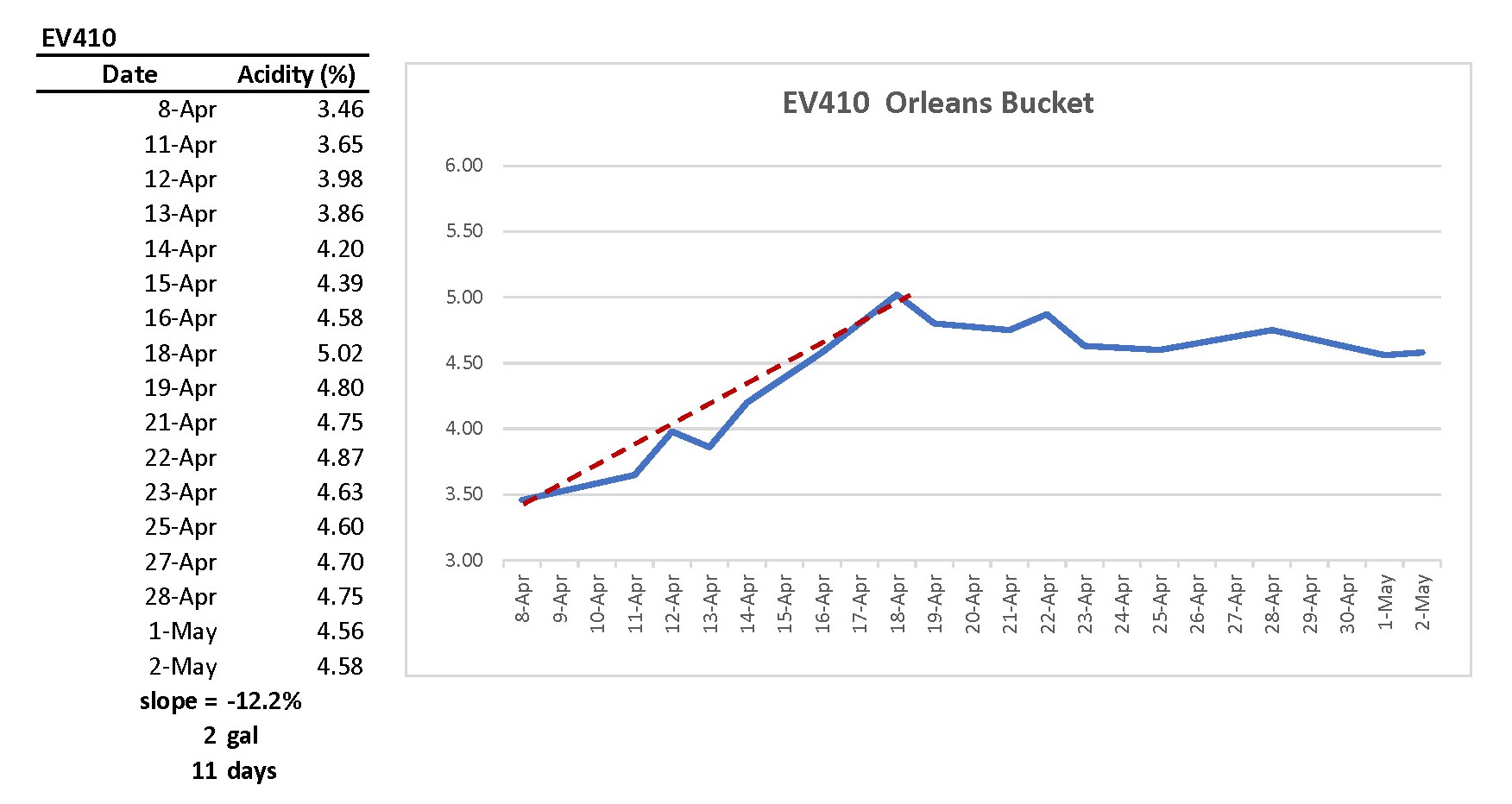
Aeration System
Process Description
We initiated our aeration system trials on December 7th. Our initial and subsequent trials showed that this method volatilizes off a portion of the alcohol in the wine, leading to a lower acid product that would not consistently meet the Federal requirement of a minimum 4% acidity for vinegar. This method was abandoned due to these problematic results.
Aeration System
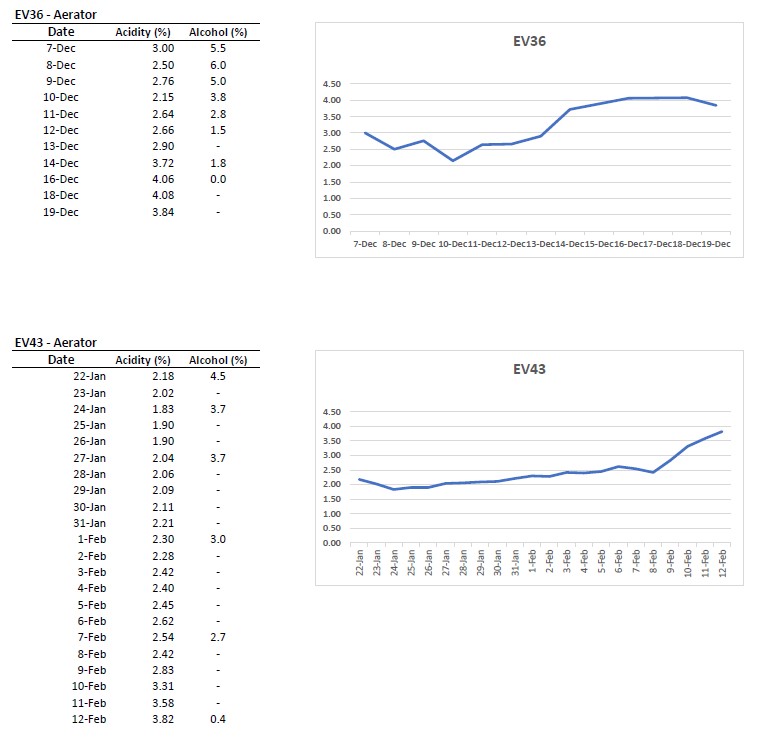
Evaluate Culinary Benefits of Vinegar from Each Production Type
The evaluation of culinary benefits has been rolled into the tasting survey described in the Evaluate Public Demand for Local Craft Elderberry Vinegar (see below). The survey found that salad dressings is the most likely common use for the product. Participants indicated they would use the product on salads and veggies made into salad dressing, in marinades for veggies, seafood, and meats, in health tonics to drink mixed with other health ingredients, and as an ingredient in cocktails and mocktails.
We have sold the vinegar to a local restaurant, and they use it to create an elderberry gastrique as a sauce for a blueberry tart. A second local restaurant is using the vinegar in the dipping sauce for their Khinkali (meat dumpling), and as an addition to their chili oil. If the restaurant scene happens to embrace the vinegar, it is felt that a host of unique creations can be developed by the chefs.
Evaluate Health Chemistry of Vinegar
As major component of the project, Dr. Chung-Ho Lin and Dr. Isa Kupke of the University of Missouri, conducted metabolic analysis using high resolution spectrographs of our intermediate (juice and wine) and final (vinegar) products to determine the amount of health promoting compounds they contain. They identified >147 health promoting compounds, and measured the relative concentrations of each compounds across all the products sampled.
A spreadsheet of the survey data is available here Elderberry_Vinegar_Wine_Final_Metaboanalyst With FSF Notations
Conclusions are presented below:
Report on Elderberry Juice, Wine and Vinegar Untargeted Analysis
Dr. Chung-Ho Lin and Dr. Isa Kupke
University of Missouri
Introduction
This report presents a detailed analysis of the metabolic profiles of elderberry juice (EJ35), elderberry vinegar (EV410, EV412, EV46), and elderberry wine (EW310, EW311) samples (Table 1). The objective is to putatively identify and compare health-promoting compounds across these products through untargeted analysis.
Table 1: Elderberry juice, wine and vinegar collection date and processing method.
|
Sample name |
Collection date |
Source |
|
EJ35 |
12/15/23 |
First run juice |
|
EW310 |
3/17/24 |
Wine from first run |
|
EW311 |
3/17/24 |
Wine from pomace |
|
EV46 |
3/18/24 |
Generator |
|
EV410 |
4/21/24 |
Orleans bucket |
|
EV412 |
5/13/24 |
Orleans barrel |
Principal Component Analysis (PCA)
The PCA plot below summarizes the variance in the data across the elderberry samples. PC1 explains 56.2% of the variance, while PC2 explains 20.3% (Figure 1). This analysis highlights the differences in metabolic profiles between the juice, vinegar, and wine samples.
Below is the PCA scores plot showing the clustering of the elderberry samples:
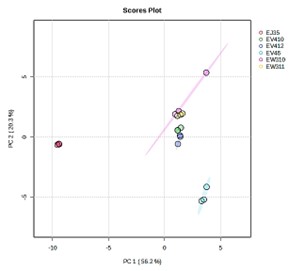
The PCA plot shows distinct clustering of the elderberry samples, with EJ35 (juice) separated from the vinegar and wine samples along PC1, which explains 56.2% of the variance. The vinegar samples cluster together, indicating similar metabolic profiles, while the wine samples also form a separate cluster. This separation suggests that the fermentation process in vinegar and wine production significantly alters the metabolic profile compared to juice, potentially affecting the concentrations of putatively identified compounds.
Heatmap Analysis
The heatmap shows the levels of various compounds in elderberry juice, vinegar, and wine (Figure 2). Red indicates high concentrations, while blue shows low levels. The clustering of samples in the heatmap reveals that elderberry juice (EJ35) has a distinctly different profile from vinegar and wine, with its own unique set of compounds. The vinegar samples (EV410, EV412, EV46) cluster together, sharing a similar profile but with some variation due to different preparation methods. The wine samples (EW310, EW311) also form a separate cluster, highlighting a unique profile shaped by the winemaking process. This clustering shows that the fermentation of vinegar and wine production changes the metabolic profile of the elderberry product. These differences make vinegar and wine promising for further research.
Below is the heatmap showing the top 50 putatively identified health-promoting compounds across the elderberry samples:
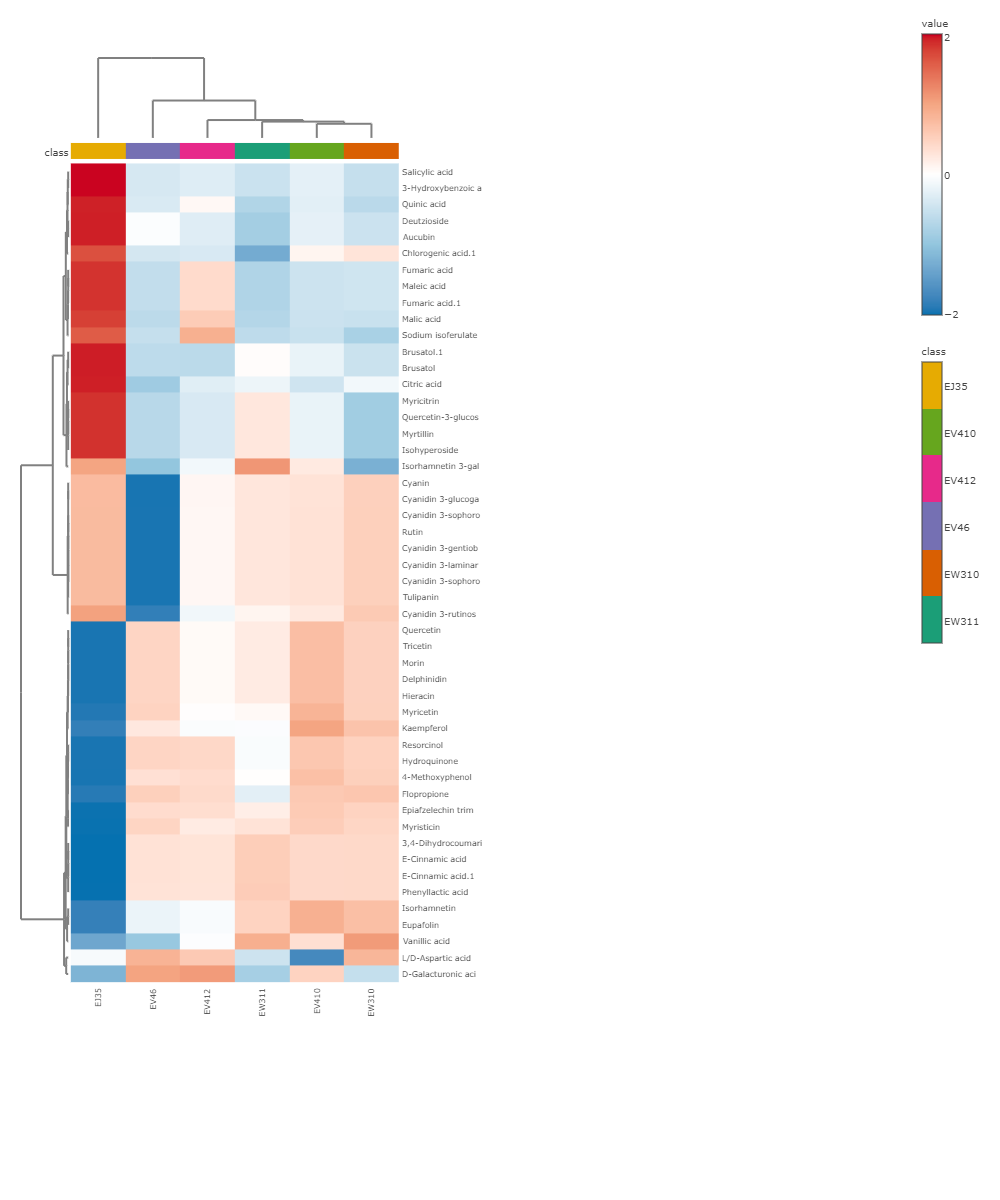
Conclusion
The analysis of the elderberry products highlights the unique chemical profiles of the health-promoting compounds in elderberry vinegar and wine compared to juice. The higher concentrations of specific compounds in vinegar suggest that it may offer benefits different from those of juice and wine. The PCA and heatmap analyses confirm the significant impact of fermentation on the metabolic profiles, further supporting the potential of elderberry vinegar and wine as multifunctional ingredients in various industries.
Evaluate Public Demand for Local Craft Elderberry Vinegar
We received assistance from the University of Missouri Extension Agriculture, Food and Forestry Innovation Center for this step of the project. We developed a survey, with the assistance of Business Specialist Whitney Schmidt, to help determine public reaction to the product. The surveys were conducted in conjunction with a tasting of the vinegar at four separate events:
- Comprehensive Elderberry Workshop, June 13-14 2024
- Kansas City Public Television event, June 20, 2024
- Brookside Farmers Market, June 22, 2024
- Ivanhoe Neighborhood Farmers Market, July 6, 2024
Participants were given one of three different vinegars to taste, and asked a series of questions relating to which batch they were tasting, their thoughts on its characteristics, and how they would consider using the product. A summary of the results and background info are presented below.
Summary of Survey Findings and Recommendations: Fair Share Farm Raw Elderberry Vinegar
Whitney Schmidt
University of Missouri Extension Agriculture, Food and Forestry Innovation Center
The Fair Share Farm Elderberry Vinegar survey was conducted as a double-blind study with 114 participants completing a survey available on their smartphones or in paper format. Participants answered several questions: “Which sample do you have?”, “Rate on a sliding scale of 1-100, where 1 means you did not enjoy and 100 means you very much enjoyed” for Smell, Taste, and Finish. They were also asked to give descriptive words for the sensory characteristics of the sample, rate how often they use “other elderberry products”, “raw elderberry vinegar”, and “other types of vinegars”, on a scale from never to multiple times per week, and last, offer feedback on how they would potentially use a raw elderberry vinegar product.
The survey was conducted across four sampling clusters: The Comprehensive Elderberry Conference (Conference), Ivanhoe Farmers Market (IFM), Brookside Farmers Market (BFM), and a one-day Kansas City Public Television pop-up Farmers Market event (KCPT). These clusters helped identify trends and preferences, with Conference attendees being more familiar with elderberries and more accepting of unique flavors. There were three sample types that had different methods of production that were being compared. Sample type O is pomace wine processed into vinegar via the generator and sometimes develops some off aromas. Sample type X is juice wine processed into vinegar via the generator, while sample type -- is juice wine processed into vinegar in the Orleans Barrel.
Among the three sample types, Sample “O” received the lowest average smell ratings. However, overall average preference ratings did not show significant deviation across the three sample types for taste and finish. Sample methods “X” and “--” were described more favorably, especially regarding finish, and might be better suited for farmers market crowds. In contrast, those familiar with the sensory aspects of elderberries, such as attendees of the Comprehensive Elderberry Conference, have more discerning tastes toward elderberry and may embrace the “funky” and “yeasty” flavors in the “O” method.
The data indicates that the most common use for the product is overwhelmingly as a salad dressing. This suggests a strong potential market for a finished salad dressing product that could perhaps incorporate a sweet element for balance. Additionally, developing a secondary product that highlights health benefits and can be used as an ingredient in drinks and health tonics could be a strategic move. Participants indicate they would use the product on salads and veggies made into salad dressing, in marinades for veggies, seafood, and meats, in health tonics to drink mixed with other health ingredients, and as an ingredient in cocktails and mocktails. Usage frequency of elderberry vinegar was very low across all sampling clusters, with the majority of samplers indicating they had never use it, highlighting the novelty of the product and the potential need for significant marketing efforts. The Brookside Farmers Market had the most frequent users of “other vinegars”, with over half using them multiple times per week.
Based on the survey results, a few recommendations have been made. Further product development could create a product that serves as a comparable substitute, providing the same usability with additional value-added qualities to command a higher price point and take some of the guesswork out of explaining such a unique product. Production methods could be adjusted to enhance sensory attributes described favorably (such as color, and aromas) and reducing unfavorable perceptions to improve the hedonic appeal of the end product, especially if sold as an ingredient, like apple-cider vinegar, rather than a more straight forward use /comparable substitute product, like salad dressing. Marketing messages can highlight unique selling points such as health benefits and unique flavor profiles, perhaps including recipes for suggested health tonics like “infusions”, “shrubs”, “oxymels” and “switchels” as suggested by survey respondents. The target audience should include local sourcing, health-conscious consumers and gourmet cooking enthusiasts, with customers personas developed based on identified market channels, demographic and data correlated with the survey sampling clusters. There could be potential partnerships with local chefs and health focused-local-sourcing grocery stores. Further research could involve follow-up studies to test refined product variations and conducted in targeted market venues for deeper insights.
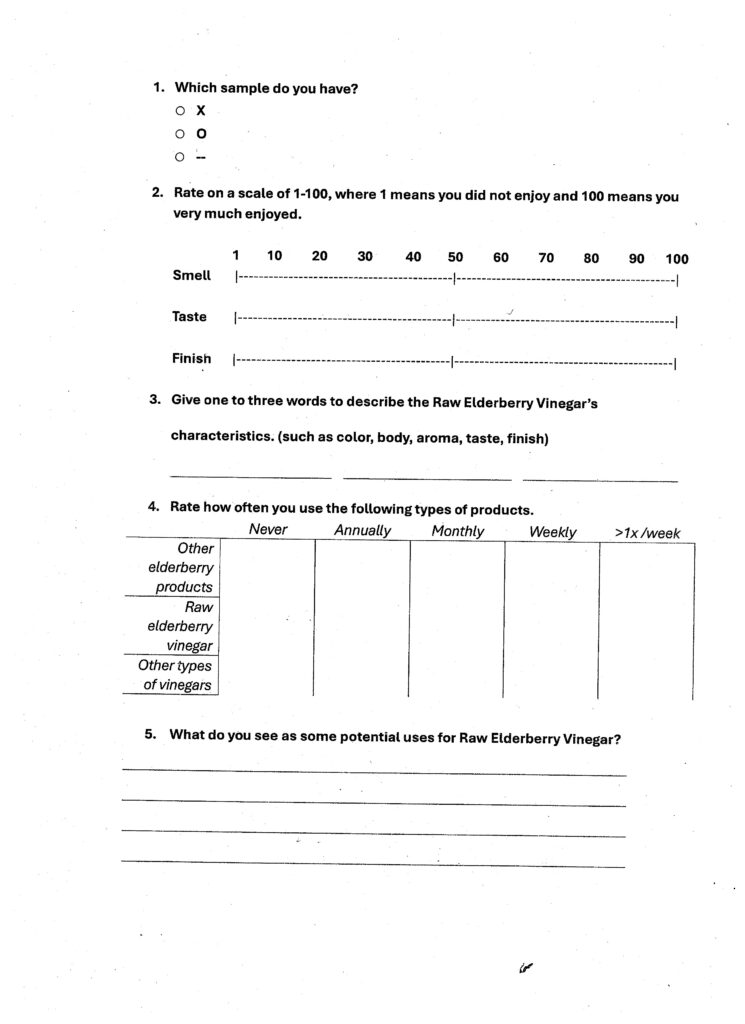
A spreadsheet of the survey data is available here Elderberry Survey Data
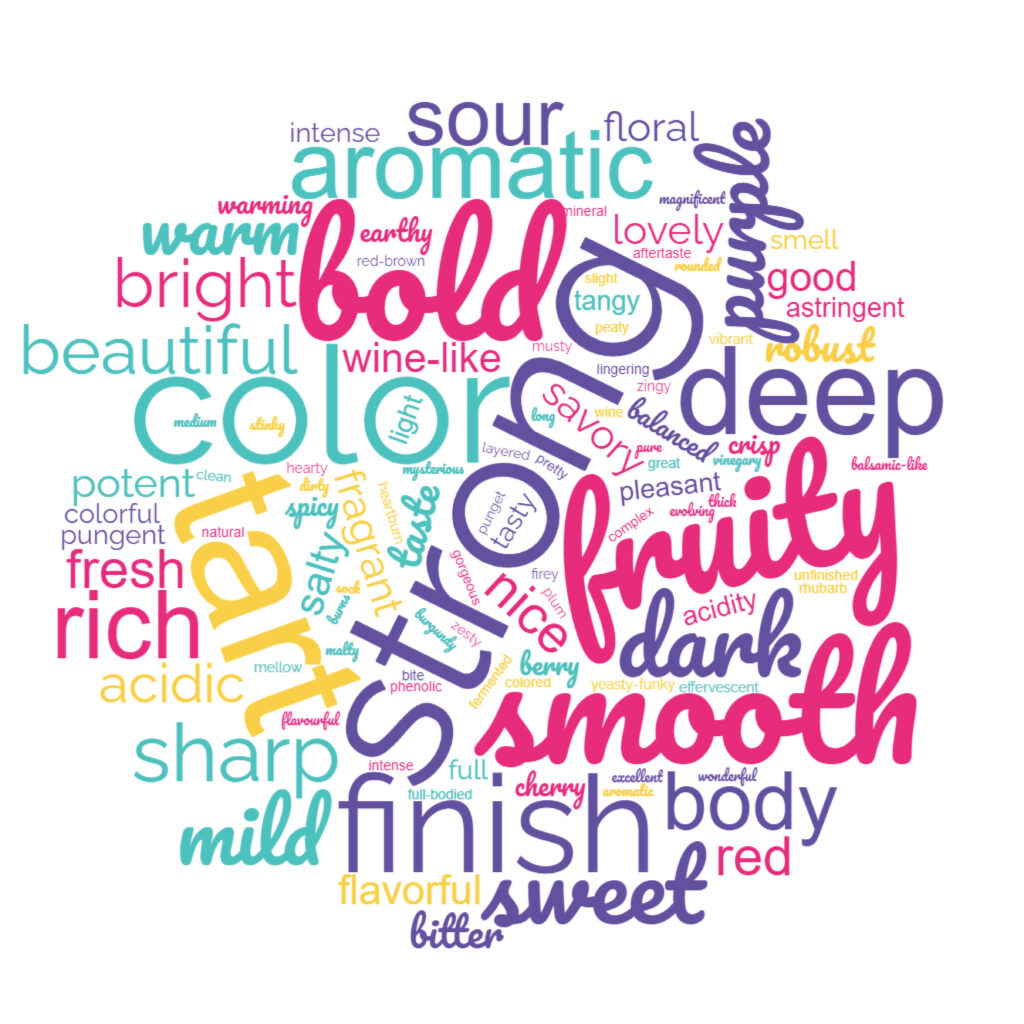
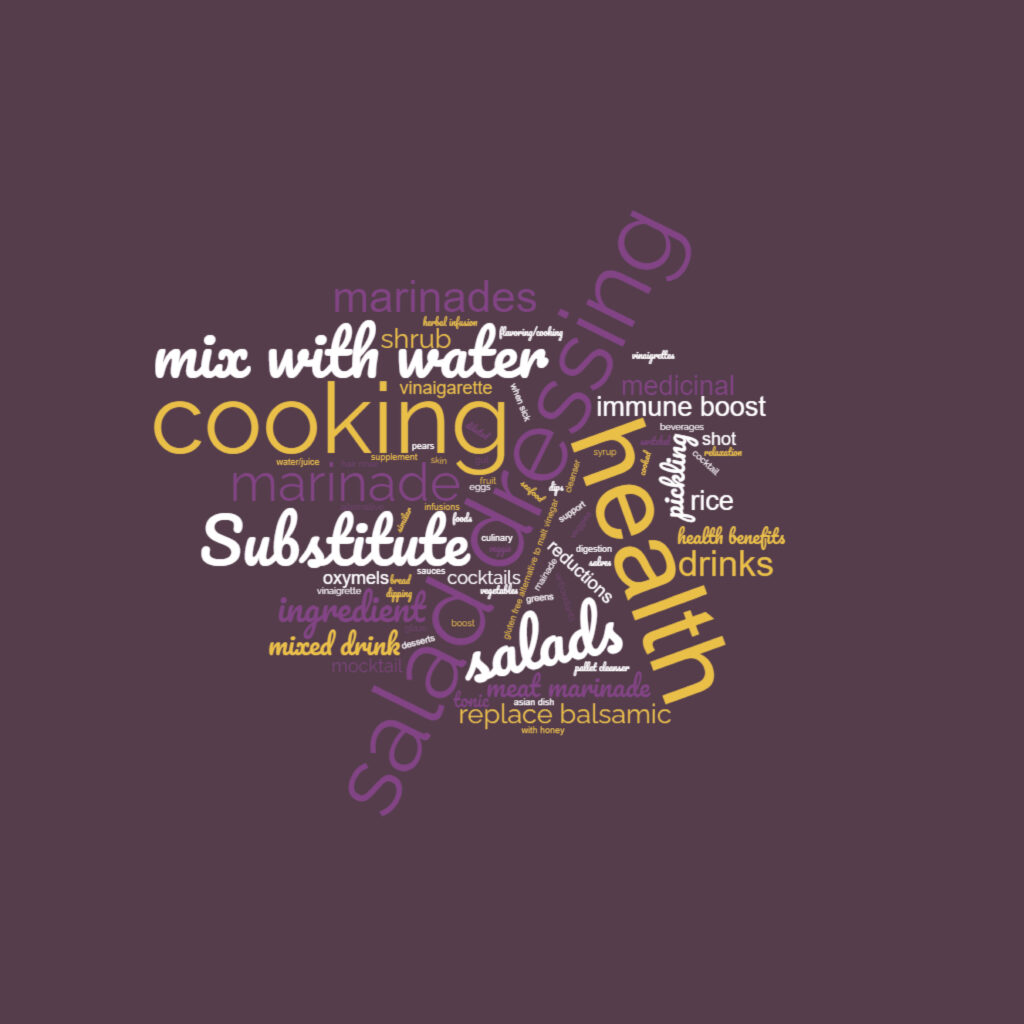
Evaluate Feasibility of Restaurant Production of Elderberry Vinegar
Chef Kendall Harris pursued the opportunities that might be available for restaurants to utilize elderberries in the production of raw vinegar. However, further review with the Missouri Department of Alcohol and Tobacco clarified that making even a small amount of wine at an establishment will require obtaining the same Manufacturer license that we obtained. This precluded restaurant production and sale of raw elderberry vinegar to be conducted as a part of the project. Chef Kendall still attempted small-scale tests to evaluate restaurant scale techniques and the technical feasibility of raw vinegar production.
While a finished raw American elderberry vinegar was not achieved by Chef Kendall's efforts, he was able to relate the many difficulties of fermenting vinegar in a restaurant setting. These issues are noted below.
- Such a process requires the buy-in of not just the head chef and/or owner, but an awareness of the process by all of the kitchen staff. Most professional kitchens are relatively small, and space is at a premium. A proper dedicated space for the wine and vinegar fermentation were not feasible at the several restaurant kitchens he worked in during the time of the project.
- The care and monitoring of a fermentation process requires regular attention and oversight. A production log, and other notations on the type of ferment and its condition is necessary. This work is the responsibility of the fermenter, and taking time from other staffers to educate them on the process and have them assist in monitoring the process, is not a reasonable request.
- The ability to keep the fermentation steps at a proper and consistent temperature is a challenge, even in a modern, high-end restaurant kitchen. This is due, in part, to the normal temperature fluctuations in an operating kitchen, and the limited space in most of a restaurant's temperature controlled spaces. Having this process control is critical to obtaining a quality final product.
- Chef Kendall decided to complete the berry-to-wine-to-vinegar process in his home, to have more control over the process. This proved difficult too, within his home he did not have an area with an adequately controlled temperature. In addition, he moved during the project and suffered an extended power outage, adding more complications to the attempt.
- When I first met Chef Kendall he presented to me his musings on the idea of a fermentation lounge. If such a lounge were to exist, with a focus on quality ferments, food diversity, and craft products, then perhaps the attention required to make raw vinegar would be possible on a restaurant scale.
Obtain Necessary Licenses and Approvals Winery License/Permit
- The winery permitting and licensing is not necessarily a difficult process. Time is spent gathering documents and information from numerous entities and agencies, and that opens more opportunity for frustration. In general though, the applications are straightforward.
- Once the permits were issued we were required to report our wine storage inventory monthly to MO ATC and annually to TTB, but had no tax obligations.
- We do have an annual fee to pay to MO ATC of $200, but no fees are required by TTB.
Operations Evaluation
- A systematic record-keeping system is essential to a successful operation.
- It is important to have the skill to conduct wet chemistry analyses to determine the acidity and alcohol content during vinegar production. The ability to mix reagent competently and safely is also important.
- The condition and quality of the juice to be used for the wine production is critical. Based on input from the project team and others, a cold-press, low-pressure process was used. The juice was kept separate from the berry pulp (pomace) and they were fermented into wine separately. This low pressure press kept the waxy resin from the berry skins from appearing in the juice-only wine.
- Five hundred pounds of berries were processed as a part of the feasibility study. Equipment used included a juice press, 50 gallon food-grade drums, 60 gallons of glass containers, vinegar generator, and a 35-gallon wooden barrel. A temperature controlled rooms and heat mats were also used to properly manage the wine and vinegar fermentation and storage operations.
- The main batch consisted of 375 lbs of elderberries that were juiced into 20.5 gallons of juice and 208 lb pomace.
- An alcohol by volume (ABV) of 6% was used as the target for the wine. This level of alcohol allows us to obtain a vinegar with an acidity of between 4 and 6%.
- Both the juice-only and pomace batches required dilution with a 12 brix sugar solution to thin out the viscous nature of the elderberry juice. The trials are aimed at creating the least diluted and purest version of elderberry vinegar. A total of 25 gallons of wine from juice, and 23 gallons of wine from pomace were produced (48 total gallons of still wine from 375 lbs. of berries).
- The wine made with the pomace had a tendency to form a mold while the juice-only wine was clearer and did not mold when airlocked.
- It is feasible to produce Raw American Elderberry Vinegar using the vinegar generator method. Production runs using the generator were consistent in operation and quality. Cleaning of the generator once per week is recommended to prevent overflows. The largest generator batch we ran produced 4 gallons/month of finished vinegar.
- It is feasible to produce Raw American Elderberry Vinegar using the Orleans Barrel method. Simple modification of a standard wood barrel that previously held alcohol was sufficient to create the apparatus. Operation was able to proceed promptly, as we were able to situate the barrel in an 84 ºF room. The barrel can produce approximately 8 gallons/month of finished vinegar.
- It is feasible to produce Raw American Elderberry Vinegar using the Orleans Bucket method. Simple modification of a standard plastic container was sufficient to create the apparatus. Operation was able to proceed promptly, warmed with a heat mat set at 84 ºF. The bucket produces only small quantities of less than 2 gallons/month.
- It is not feasible to produce a consistent Raw American Elderberry Vinegar using the aeration method. Alcohol in the wine was evaporated by the aeration, leading to reduced final acidity, and lack of flavor.
Evaluate Culinary Benefits of Vinegar from Each Production Type
- The vinegar is currently being used by a local farm to table restaurant as a unique addition to the fruit tarts they create on their dessert menu. The 'gastrique' created from the vinegar indicates a novel recipe for the vinegar.
- A second local restaurant is using the vinegar as a dipping sauce for their Khinkali (meat dumpling), and as an addition to their chili oil.
- Raw American Elderberry Vinegar is being looked upon as a unique product by local chefs.
- Restaurant sales have been limited to vinegar made from juice-only wine, and processed in the vinegar generator. This method produced the most consistent and deepest colored vinegar.
Evaluate Health Chemistry of Vinegar
- The analysis of the elderberry products highlights the unique chemical profiles of the health-promoting compounds in elderberry vinegar and wine compared to juice. The higher concentrations of specific compounds in vinegar suggest that it may offer benefits different from those of juice and wine.
- The PCA and heatmap analyses conducted by the University of Missouri confirm the significant impact of fermentation on the metabolic profiles, further supporting the potential of elderberry vinegar and wine as multifunctional ingredients in various industries.
Evaluate Public Demand for Local Craft Elderberry Vinegar
- Our tasting surveys showed that the vinegar was well received by the general public, and by the professional elderberry community. The vinegar was generally considered to be a bold, strong, and fruity product. Subtle differences in the aroma and flavor was detectable between the three styles of vinegar used in the survey, indicating that the processing methods used impact the final product.
- The survey also showed that participants feel the most common uses they see for the product is as a salad dressing, marinade, and as a substitute for other vinegars. Its value as a health product was also noted by the survey participants.
Evaluate Feasibility of Restaurant Production of Elderberry Vinegar
- Logistics and cost precluded the licensing of a restaurant as a winery for this project.
- Production of elderberry vinegar in a restaurant setting requires a serious commitment by the owner and staff. Production of a quality product requires regular testing and monitoring, as well as the appropriate space for fermenting the wine and vinegar.
- When I first met Chef Kendall he presented to me his musings on the idea of a fermentation lounge. If such a lounge were to exist, with a focus on quality ferments, food diversity, and craft products, then perhaps the attention required to make raw vinegar would be possible on a restaurant scale.
General Conclusions
- It is recommended that, prior to initiation of a raw elderberry vinegar production facility, the vinegar maker spend time researching both fruit wine and vinegar production methods. Malle-Schmikl is a good first stop in learning about these fermentation steps, as well as purchasing a vinegar generator to produce small volumes of marketable raw American elderberry vinegar.
- Energy use can be significant as heating elements are beneficial equipment during the vinegar fermentation step. Consistent room temperature plays an important role in the ability to produce a consistent product.
- While creating Raw American Elderberry Vinegar directly from elderberries requires knowledge, skill, patience, and experience, it is nonetheless a feasible value-added process for a small farm.
Educational & Outreach Activities
Participation Summary:
We have regularly posted updates on the project on social media via our Instagram and Facebook pages. This has included posting news on being awarded the project, obtaining our Federal and State licenses as a winery, pressing of the elderberries, wine production, maiden operation of the vinegar generator, results of our tasting survey, results of the health component analyses, and other milestones.
We gave tours in 2023 for the Missouri Organic Association (40 attendees), which included showing attendees our vinegar production operation. In addition, we hosted tours for the Brookside Farmers Market and we had an open house at the farm in September 2024, though those events were mostly for the public and so those numbers are not included here.
In June 2024 we presented our preliminary results at the 20th anniversary Comprehensive Elderberry Workshop in Columbia, Missouri. That reached 40 farmers and 40 ag professionals.
Learning Outcomes
We learned that the production of Raw American Elderberry Vinegar on a small farm scale is feasible, and that the product has both inherent health and culinary benefits. As a small farm that has mainly raised annual vegetables for 20+ years, it provides an avenue to build our perennial plantings (native fruits and nuts) and have a unique and beneficial value-added product from them. As a fermented product, it is consistent with our existing value-added product operation (live-culture vegetable ferments). As aging farmers, a perennial-based agricultural system has less physical demands, and holds the potential of a sustainable future for both the land and the farmers.
The project results have created the potential for a new approach to on-farm value-added food production. Our elderberry expert collaborators, The University of Missouri and River Hills Harvest, have indicated a serious interest in continuing this evaluation of elderberry vinegar production.
We recommend that farmers interested in producing raw vinegar conduct personal research and small-scale operation to better understand the nature of raw vinegar production. We also recommend that they read this report, as it provides insight to the nature of a production-scale operation.
Project Outcomes
A local winery that has planted elderberries contacted us for assistance in their attempts to make elderberry vinegar. They have also purchased a vinegar generator but have had troubles getting it working. They purchased "mother of vinegar" from us to assist their production efforts.
Upon completion and review of their analytical analysis of juice, wine and vinegar, the University of Missouri noted the following:
"Please find the attached for the results of your elderberry vinegar and wine samples. We have identified >147 health promoting compounds. You will find the relative concentrations of each compounds cross all the products that you delivered to us.
We plan on working with you and (name) to secure additional resources with this preliminary data to scale up the project. (Name) is working on identifying the possible funding sources (such as USDA-NIFA) that would sponsor the value-added, functional food and beverage research."
